

RICHMOND COLLEGE



CATALOGUE OF RICHMOND COLLEGE

RICHMOND, VA.
SESSION
RICHMOND: J. L: HILL PRINTING COMPANY. 1893,
\trustees.
Hon. J. L. M. CU RR Y , LL. D ., PRESIDENT.
Rev. H . A . TUPPER , D. D . , VICE - PRESIDENT,
Rev. CHARLES H. RY L AND , D. D.,
RE C ORDI NG S E C RETARY, F IN ANC I AL SECRETARY, AND T REASURE R ,
JOSIAH R,L.,ND, ESQ...... Richmond.
J.C LONG, D D, LL. D. . Chester, Pa.
MAJOR A. R. COC:RTNEY
J. ALFRED JONES, LL. D.
J. CHRISTIAN, LL. D ..
'IV. E HATCHER, D. D.
A. E. DICKINSON , D. D
JOHN C WILLIAMS,ESQ.. ,
J R. GARLICK, D. D . .
C . H. RYLAND, D. D ...
COL. W. E. TANNER.
H. A. TUPPER, D. D ..
. Richmond.
. Richmond.
. Richmond
. Richmond.
. Richmond
. Richmond . . . .1.shland. Richmond. Richmond
. Richmond.
T. s. DUNAWAY, D. D ... F r edericksburg
Il. WYTHE DA\'IS, M. D .... Richmond
I. B. LAKE, D. D . . Rectortown.
J. L. l\L CURRY, LL. D ..
C. F, JA)IES, D. D ... , .
THOMAS TABB, ESQ. . . .
GEORGE B. STEEi,, D D. S. _\, E. D. D ....

. Richmond. . Dam·ille. . Hampton Richmon<.!. Portsmouth.
Jl'DGE w. R. BARKSDALE .. Houston. C. V. ::l[EREDITII, ESQ..... Richmond .
.TC:DGE B. T. Gl'NTr-:1:...• l.ccomac C. II
RE\', R. R. ACREE •
H. R. Pou.urn, LL D.
GEOltGE Cool'!-:1,, D. D. Roanoke Richmond. Richmond
w~r.w. LANDllli~[, D. D. . Richmond
GEORGE SWANN, E,Q .. Clifton Forge .
CON\\'AY R. SANDS , EsQ ... Richmond
REI', JOHN R. B.-1.GBY Ballsville.
JOHN l\I. PILCHER, D. D . Petersburg.
J. J. ::IIONT.IGUE,EsQ. . . Richmond.
Tuos. C'.WrLr.LDrs, JR., EsQ .. Richmond
T. H. Er,LETT, EsQ. • .
JOHN T GRIFF!N, ESQ. Richmond. Churchlan<.l.
A J. MONTAGl'E,Esq. lJanyille.
::IL l\I ~Iomus, E,Q. . . Glade Spring.
J. T. ELLYSO:S,EsQ.. . . Richmond .
JUDGE D. B. GRDISLEY' . . Culpeper:
JOHN B Tl'RPIN, D. D .. Charlottesville.
<Bommitteesof tbe ~rustees.
Finance.
JOHN C. \VILLIA'IIS, J. J. MONTAGUE, T. C. WILLIAMS, C. V. i\1EREDITH, \Vl\f. E. TANNER . Endo w ment.
J. TAYLOR ELLYSON, A . E. OWEN, A. E. DICKINSON, T. H . ELLET~ B.~ GUNTER
Grounds a11d Buildings,
H. R . POLLARD, H. W. DAVIS, J. J. MONTAGUE, J. R. GARLICK, R. E. GAINES.
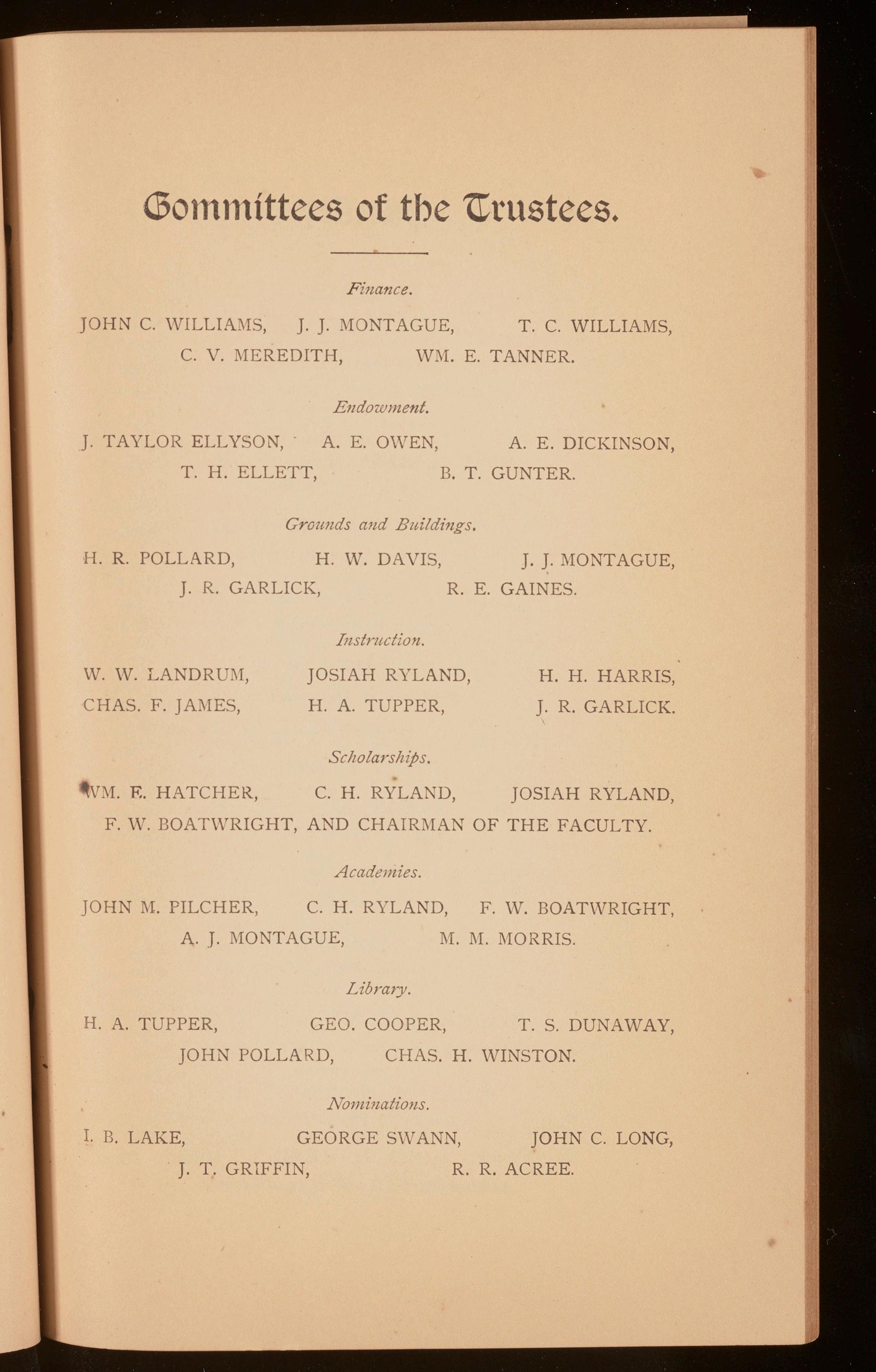
W. \V. LANDRUJ\1, CHAS. F. JA:\IES,
V:\1. F.. HATCHER, I11str11ction
J OSIAH RYLAND, H. A. TUPPER, Scliolarslzips.
C. H. RYLA;-..'D,
H H . HARRIS, J. R. GARLICK.
JOSIA H RYLAN D, F. \\ '. BOATWRIGHT, AND CHAIRi\IAN OF T HE FA CULTY. Academies.
JOHN l\I. PILCHER, C. H. RYLAND, F. \V. BOAT W RIGHT, A. J. MONTAGUE, 1\1 1\1. MORRIS. Library. H. A TUPPER, GEO COOPER, T. S. DUNAWAY, JOHN POLLARD, CHAS . H . WINSTON. lvomi11atio11s.
I. B. LAKE, GEORGE SWANN, J OH N C. LO NG , J. T . GRIFFIN, R. R ACR EE

jfacultr.
CHAIRMAN, B. PURYEAR, LL. D.
EDMUND HARRISON, A. l\I., Professor o.f La!i11.
H. H. HARRIS, M.A., LL. D., Pro.fessor o.f Gr eek.
F. W. BOATWRIGHT, M. A., Professor o.f llfodem Languages.
JOHN POLLARD, A. M., D. D., Professor of Englis!z.
R. E. GAINES, M. A., Professor of JIIatlzematics.
CHARLES H. WINSTON, M. A., LL. D., Professor of Plzysics.
B. PURYEAR, A. l\I., LL. D., Professor o.f Clzemistry.
WILLIAM D. THO:\1AS, M. A., D. D., Pro.fessor of James Tlzomas, Jr., Sc!zool of Pliilosoplzy.
ROGER GREGORY, B. L., T. C. Williams Professor of Law.
REV. CHAS. H. RYLAND, D. D., Librarian and Superintendent of Grounds.
CHAS. 1\1. HAZEN, M. A., Instructor in Phys/cal Otlture.
JOHN H. READ, Assistant Instruc!or in Physical Otlture.
STUDENTS.
ABBR EVIA TIO NS.
L.-Latin. Ger.-German. Phys.-Physics. Grk.-Greek. E.-English. C.-Chemis try Fr.-French. M.-Mathematics. Phil.-Philosophy. A dash (-) in list of studies indicates that some preceding it were dropped to take up what follows.
ACREE, RUSSELL, ADDISON, W. MEADE, ALLEN, NOEL J., ALLISON, HENRY T., ARMSTRONG, H. D.,
BAGBY, R. HUGH, BATES, JOHN \\T., B INFORD, JESSE H., BLAIR, ADOLPHUS, JR., BLAIR, \,\/ILLIAM C., BLAIR, WALTER D., BosHER, JUDSON s., BOSHER, ROBT. S., JR., BOSHER, PERCY S ., BOWDEN, ROBERT H., BOWE, N. STUART, BowE, Ro. BRUCE, BOYCE, CLINTON A., BOYD, WHIT C., BRADSHAW, J. LESLIE, BRITT, \VALTER L., BURNETT, H. C.,JR., CABELL, \NALT ER C., CALZADO, EUSE BIO F., CAMPBELL, HARRY L, CARDENAS, JOSE M., CARDOZO, B. POLLARD, CARDOZO, J. MOSBY, CARDOZO, LEWIS A., CHENOWETH, REA, CHILDRESS, JOHN B., CLAPP, HUGH B., CLEMENT, CHARLES, COCKE, M. ESTES,

Danville, Va., Richmond, Va., Buckingham Co., Va., Fauquier Co., Va., Richmond, Va.,
Chesterfield Co., Va., Richmond, Va, Henrico Co., Va., Richmond, Va., Pittsylvania Co., Va., Richmond, Va., Richmond, Va., Richmond, Va., Richmond, Va.,
Isle of Wight Co., Va., Richmond, Va., Richmond, Va., Richmond, Va., Richmond, Va.,
Burkeville, Va., Bertie Co., N. C., Richmond, Va. , Richmond, Va.,
Saltillo, l\Iex ., Richmond, Va., Saltillo, Mex., Richmond, Va., Hanover Co., Va., Richmond, Va., London, 0., Pittsylvania Co., Va., Corrytown, Tenn., Campbell Co., Va., Roanoke Co., Va.,
L., Ger., E., M. Ger., E., M., C. L., Grk., M., Phys.,-E. L, Ger. E., M.,C.
L., E., C., Phil. L., M., Phys., C. L., E., M. Fr., Ger., E., C., Phil. L., Grk., C. L., Grk., Fr., Ger., M. L., M., Phys., (:. L., Fr., M. L., Fr., E., M. Grk., E., Phil. L., Ger., M., Phil. L., Fr., M., Phys. Law.
L, M., Phys. Fr., E., M., Phys. Grk., Fr., M., Phil. E., M., Phil.
Fr., M., Phys , C Fr., E., M. L., Ger. M., Fr., E., M. Fr., III., Phys. L., Fr., Ger., M. L., Fr., Ger., M., Phys. L., E., M. L., Grk., Fr., M., Phys. L., Grk., M. E., C., Phil. L., Grk., M.

6 Richmond College.
COLE, GEo. HARRY, Baltimore, i\Id., CooKE, C. l\f., JR., Louisburg, N. C., COPENHAVER,0. \V., Smyth Co., Va., COSBY,JA::.rnsT., Caroline Co., Va., Cox, GEORGE \V., Gloucester Co., Va., CRAIG, J. Doi;GLAS, Richmond, Va., CREWS,JOHN A., Danville, Va., CRITTENDEN,CHRIS. C., Burkeville, Va., E., l\I. Fr., l\I., Phys., C. E., M., Phys. M., C., Law. L., Grk, E., l\I. Law. L., Ger., E., l\I. Grk., Fr., J\1., Phys., Phil. DAVIS, EUGENE C., Portsmouth, Va., L., E., :\I. DEAN, AUGUSTUSF., Scott Co., Va., L., Fr., Ger., C. DEVAULT, SA::.I'LP., Washington Co., Tenn., L., Grk., Fr., i\I. DINNEEN, JOHN H., Richmond, Va., Law. DUKE, CLAUDIUSW., Nansemond Co., Va., L., Fr., Ger., Phys. Dt:KE, W1LLIA::.1D., Richmond, Va.,. L., Ger., l\I., C., Phil. DuLI1'G, \VILLIA::.1B , King & Queen Co., Va., L., Grk., M. DUNAWAY,THos. S., Loudoun Co., Va., Fr., E., 1\I., Phys., Phil. DUNAWAY,\VAY. F., JR., Loudoun Co., Va., Grk.,Ger.,l\I., Phys., Phil. ESSEX, J. PAUL, La Grange, l\Io., FAIRBANK,GRAYSONF., Richmond, Va., FLANNAGAN,\V:-.1.R., King & Queen Co., Va., FLEGENHEnrnR, H'Y, Richmond, Va., FLETCHER, GEO. L., \Varrenton, Va., FLORANCE,RICH'D R., Richmond, Va., FOLKES, l\1INETREE, Richmond, Va., Fox, ALBERTP, Richmond, Va., FRANKLIN,JAMESH., Appomattox Co., Va., FREE:\IAN,HAMNER G., Lynchburg, Va., GARNETT,MARCEL.B., l\Iathews Co., Va., GoLDBACK,MYER G., Richmond, Va., GRAVES,CHARLES M., Charles City Co, Va., GRIZZARD,ROBERT \V., Southampton Co., Va., GwATHMEY,WILLIAM, King William Co., Va., HADEN, HAMPTON E., Fluvanna Co., Va., HALEY, JAMEST., Pittsylvania Co., Va., HALL, ARCHER J., Culpeper Co., Va., HAMBLETON,GEo. F., Louisa Co., Va., HARRIS, GEORGET., Richmond College, Va., HARRIS, HENRY T., Buckingham Co., Va. HARRISON,CHAS. T.,t Washington Co., Va., HARRISON, Em,1'D, JR., Richmond College, Va., HARRISON, RoGER \V., Richmond College, Va., HART, JACOBD., Bristol, Tenn., HATCHER, ROBERT\V., Montgomery Co., Va.,
Grk., E., M. E., M., C. L., Grk., i\I.
Law. L., l\L, Phys. Law.
Law.
L., Fr., Ger., M., C. L., Grk., M., Phil. Law.
L., Ger, M., C. Ger., E., i\I. L.,Fr.,Ger., l\I. C.,-Grk. Grk., Fr E. L., Ger., 1\1.,C.
Law,
L., Grk., M. L., E., l\L Grk., E., 1\1., C. L., Grk., Ger., 1\1. L., E., C., Phtl. 1\1., Phys., C. L., Grk., 1\1., Phil. L., Grk., E., l\L L., Grk., Phil. Grk., Fr., E., C.
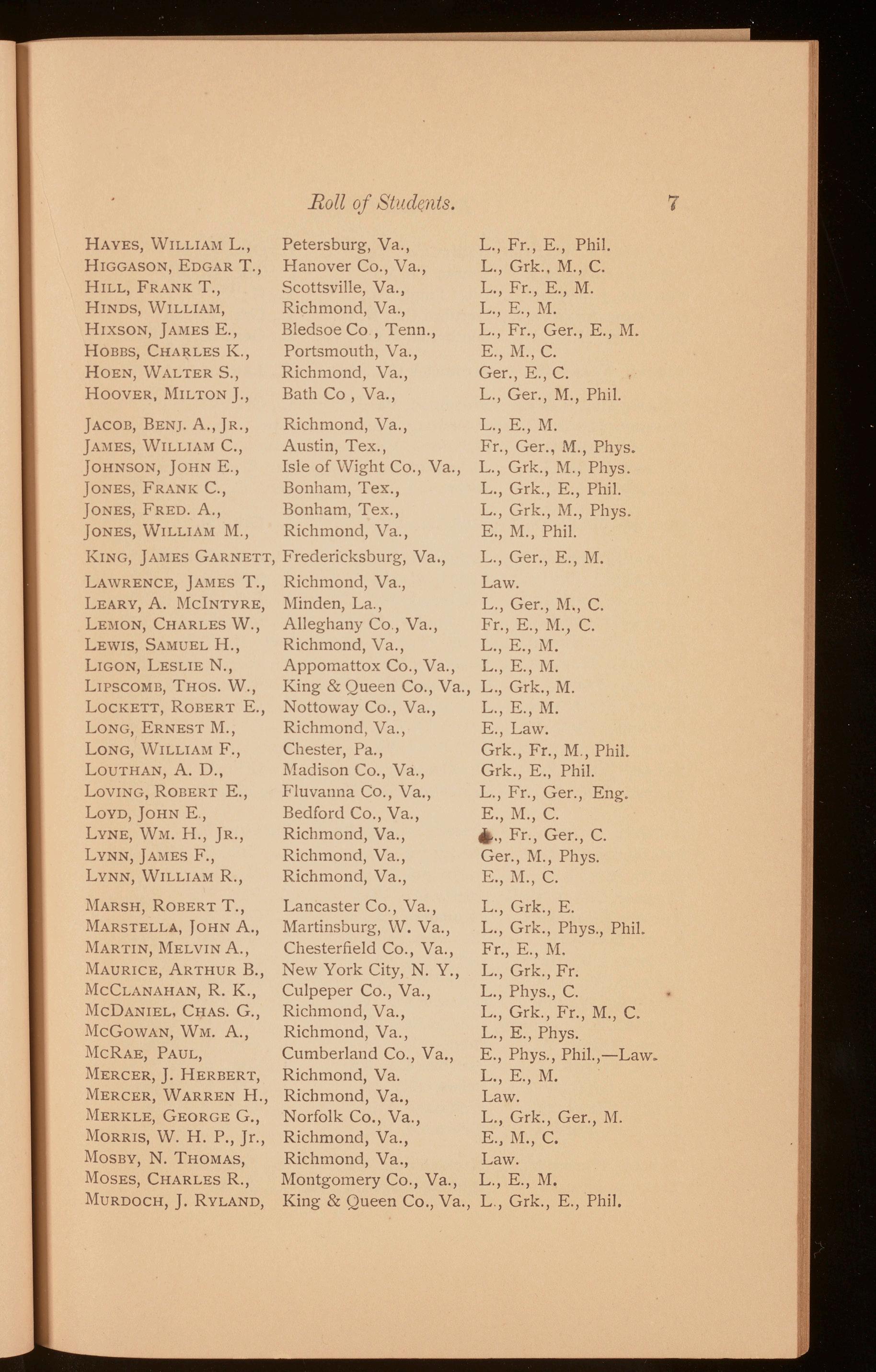
Roll of Students. 7
HAVES, \,VILLIA;\!L., Petersburg, Va., L., Fr., E., Phil. HIGGASON, EDGAR T., Hanover Co., Va., L., Grk., l\I., C. HILL, FRANK T., Scottsville, Va., L., Fr., E., M. HINDS, \VILLIAM, Richmond, Va., L., E., M. HIXSON, JAMES E., Bledsoe Co , Tenn., L., Fr., Ger., E., 1\1. HOBBS, CHARLES K., Portsmouth, Va., E., 1\1.,C. HOEN, \VALTER S., Richmond, Va., Ger., E., C. HOOVER, l\fILTON J., Bath Co, Va., L., Ger., M., Phil. JACOB, BENJ. A., JR., Richmond, Va., L., E., M. JA:\IES, WILLIAM C., Austin, Tex., Fr., Ger., M., Phys. JOHNSON, JOHN E., Isle of Wight Co., Va., L., Grk., 1\1., Phys. JONES, FRANK C., Bonham, Tex., L., Grk., E., Phil. JONES, FRED. A., Bonham, Tex., L., Grk., M., Phys. JONES, \VILLIAM 1\1., Richmond, Va., E., M., Phil. KING, JA:IIES GARNETT, Fredericksburg, Va., L., Ger., E., 1\1.
LAWRENCE, ]AMES T., Richmond, Va., Law.
LEARY, A. l\1cINTVRE, Minden, La , L., Ger., l\I., C. LE:IION, CHARLES W., Alleghany Co, Va., Fr., E., M., C. LEWIS, SAMUELH., Richmond, Va., L., E., 1\1. LIGON, LESLIE N., Appomattox Co., Va., L., E., l\I. LIPSCOMB,THOS. W., King & Que e n Co., Va., L., Grk., M. LOCKETT, ROBERT E., Nottoway Co., Va., L., E., M. LONG, ERNEST M., Richmond , Va., E., Law. LONG, \VILLIAM F., Chester, Pa., Grk., Fr., M ., Phil. LOUTHAN, A. D., Madison Co., Va., Grk., E., Phil. LOVING, ROBERT E., Fluvanna Co., Va., L., Fr., Ger., Eng. LovD, JOHN E , Bedford Co., Va., E., 1\1., C. LYNE, \,V;,,1.H., JR., Richmond, Va., ., Fr., Ger., C. LYNN, JA:IIESF., Richmond, Va., Ger., 1\1., Phys. LYNN, \,VILLIAMR., Richmond, Va., E., l\L, C. l\1ARSH,ROBERT T., Lancaster Co., Va., L., Grk., E. MARSTELLA,f OHN A., Martinsburg, \V. Va., L., Grk., Phys., Phil. l\IARTJN, MELVIN A., Chesterfield Co., Va., Fr., E., M. MAURICE, ARTHUR B., New York City, N. Y., L., Grk., Fr. MCCLANAHAN,R. K., Culpeper Co., Va., L., Phys., C. McDANIEL, CHAS. G., Richmond, Va., L., Grk., Fr., M., C. l\IcGOWAN, \VM. A., Richmond, Va., L., E., Phys. McRAE, PAUL, Cumberland Co., Va., E., Phys., Phil.,-Law.
MERCER, J. HERBERT, Richmond, Va. L., E., 1\1.
MERCER, WARREN H., Richmond, Va., Law.
MERKLE, GEORGE G., Norfolk Co., Va., L., Grk., Ger., l\'I. MORRIS, \V. H. P., Jr., Richmond, Va., E., 1\1., C. l\IosBY, N. THOMAS, Richmond, Va., Law.
MOSES, CHARLES R., l\1ontgomery Co., Va., L., E., M.
MURDOCH,J. RYLAND, King & Queen Co., Va., L., Grk., E., Phil.
8 Richmond College.
NEATHERv,R. WALTER, Halifax Co., Va.,
NELSON, EDWARD R., Louisa Co. Va.,
NEWBILL,J. AUBREY, West Point, Va.,
NEWSOME,ARTHUR T., Hertford Co., N. C., NORFLEET, H. L., Southampton Co., Va.,
OSBORN, FRANK W.,
PARKER, CHARLESJ., PILCHER, EDWIN M., PLEASANTS,JOHN A., POWERS, EDGAR T., PROVENCE, H. W.;

Brunswick Co., Va., Richmond, Va., Petersburg, Va., Richmond, Va., Riclimond, Va., Richmond, Va.,
QUILLEN, MILLIGANvV., Scott Co., Va.,
RAGLAND, BUTLERW., RAGLAND,J. FEND ALL, RAGLAND, GEORGE, RAWLEY,JAMES K., READ, JOHN HENRY, REDWOOD,HARRY W., RIDDELL, IRA C ' ROBINS, CLAJBORNE, ROBINSON, CHAS. W , Roon, R. BROWNING, RYLAND, CHAS. P., RYLAND,JOHNS.,
Richmond, Va., Richmond, Va., Richmond, Va., Henrico Co., Va., Luray , Va., Asheville, N. C., Goochland Co., Va., Richmond, Va., Greenville Co., Va., Richmond, Va., Mecklenburg Co., Va., Lunenburg Co., Va.,
SALLADE,JACOB, redericksburg, Va., SAMUELS,LESLIE B., Bardstown, Ky., SANDS, ALEX'R H., JR , Richmond, Va., SCANLAND,FAYETTEE., Fairfax Co., Va , SCHOEN, CHARLES C., Richmond, Va., ScoTT, DAVID H ., Richmond, Va., SEATON, T. EMMETT, Richmond, Va., SEWARD,WILLIAM vV., Surry Co . , Va., SISK, WM. vVILBER, Culpeper Co., Va., SKINNER, T. CLAGGETT,Loudoun Co., Va., SwrTH, ALBERT W., Orange Co , Va., SMITH, STEPHEN L., Fauquier Co., Va., STUART, CHARLES E., Pula5ki City, Va., STUART, CHARLES L., Richmond, Va., SULLIVAN,JOHN A., Richmond, Va.,
L., Grk., E., M.
L., Grk., E., M. L., E.; M.
L., Grk., Fr., M. L., Ger.; E., M., Phil.
E., Law.
L., Grk., C. Law. Law.
Fr., E., M., Phys. Ger., E., Phys., Phil.
L., Grk., M.
L., Grk., Ger., M. L., Grk., M.
L., Grk., M.
L., Ger., E., M. Ger., E., Phil. Fr., E., M., Phys. L., Fr., Ger., M. L., Ger., E, M., C. L., E. Law.
L., Grk., M. Grk , E., Phys., Phil.
L., Grk , M. L., Grk., E., Phil. L., M., Phys
L., Grk., Phil. L., Ger., E. L., M . , Phil. Law.
L., E., Phys. E., M., Phys. L., Grk., E. L., Grk., M., Phys . L., Ger., E., M. L., Grk., M., Phys.
L., Grk., E, M. L., E., M.
TAYLOR, HENRY V., TEMPLE, THOMAS, Mecklenburg, Va., L., Grk., M. Prince George Co., Va., L., E., M.
Roll of Students.
'THAYER, W. EDWIN, Charleston, S. C., THORNHILL, AUBREY J., Manchester, Va.,
TRAINUM, WILLIAM H., Orange Co., Va., TRICE, WILLIAM W., Hopkinsville, Ky.,
TUCKER, W. CRUMP, Richmond, Va., TURNER, JOSEPH A., Roanoke Co., V.a., TWICHELL, HENRY C., Richmond, Va.,
VELLINEs, ROBERT E., Manchester, Va.,
"\VAITE, CHAS. M., WALTHALL, DAVID K., WATKINS, \IVILLIAMB., WEBB, Ro. BRUCE, VvELLFORD, THOS. S., WHITE, GILBERT C., \VHITE, RICHARD H.,
Culpeper, Va., Richmond, Va., Richmond, Va., Roanoke, Va., Richmond, Va., Richmond, Va., Hampton, Va.,
vVILLIAMS, FRANK, JR., Fairfax Co., Va., WrLLINGHAM,Ro. J., JR. Memphis, Tenn., \VILLIS, HERBERT A., Culpeper Co., Va., \VINSTON, PETER, Richmond College, Va., \VINSTON, GEDDES H., Richmond Co11ege, Va., \VINSTON, HARRY B., Richmond, Va.,
\\'oLFE, LINDSAV C., Giles Co., Va., VvooD, JOHN F., Bristol, Tenn., V-1RIGHT, LUNDY R., Clarksvi11e, Va.,
RECAPITULATION.

L., Grk., M. L., E., M. L., E., M. L., Grk., M. L., Fr., Ger., M. L., Grk., M. L., Grk., E., M. L., E., M. Law. Grk., M., Phys., C. L., Ger;, M. E., M. L., Fr., M., Phys. Fr., M. L., Grk., Ger,, C. E., Phys., C., Phil. L., Grk., M L., Grk., M. 1\1., Phys., C. L., Ger., E., M. E., l\I., Phys., C. Law. L., Ger. , E L, Grk., E.
ACCORDING TO STUDI S
Latin . 118 Mathematics .. Greek. 65 Physics. French 42 Chemistry .. German. 4-! Philosophy English. 80 Law
ACCORDING TO RESIDENCE. Virginia. 162 Pennsylvania Tennessee 6 Louisiana. North Carolina -! Missouri Texas 3 South Carolina Mexico 2 Maryland. Kentucky. 2 New York Qhio . 1 West Virginia.
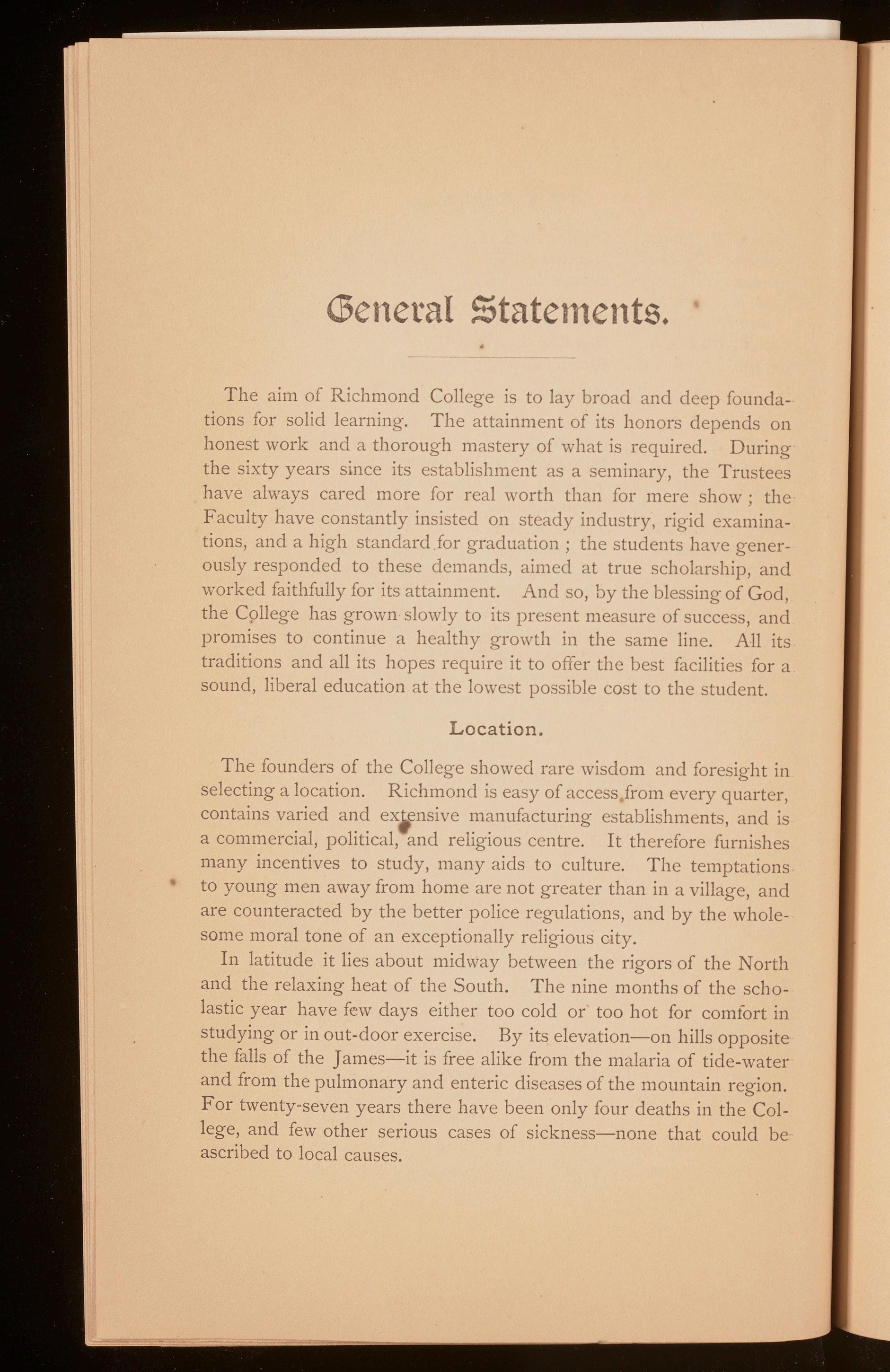
<SeneralStatements.
The aim of Richmond College is to lay broad and deep foundations for solid learning. The attainment of its honors depends on honest work and a thorough mastery of what is required. During the sixty years since its establishment as a seminary, the Trustees have always cared more for real worth than for mere show; the Faculty have constantly insisted on steady industry, rigid examinations, and a high standard for graduation ; the students have generously responded to these demands, aimed at true scholarship, and worked faithfully for its attainment. And so, by the blessing of God, the C9llege has grown slowly to its present measure of success, and promises to continue a healthy growth in the same line. All its traditions and all its hopes require it to offer the best facilities for a sound, liberal education at the lowest possible cost to the student.
Location.
The founders of the College showed rare wisdom and foresight in selecting a location. Richmond is easy of access from every quarter, contains varied and ex ensive manufacturing establishments, and is a commercial, political, and religious centre. It therefore furnishes many incentives to study, many aids to culture. The temptations to young men away from home are not greater than in a village, and are counteracted by the better police regulations, and by the wholesome moral tone of an exceptionally religious city.
In latitude it lies about midway between the rigors of the North and the relaxing heat of the South. The nine months of the scholastic year have few days either too cold or too hot for comfort in studying or in out-door exercise. By its elevation-on hills opposite the falls of the James-it is free alike from the malaria of tide-water and from the pulmonary and enteric diseases of the mountain region. For twenty-seven years there have been only four deaths in the College, and few other serious cases of sickness-none that could be ascribed to local causes.

Grounds and Buildings.
The premises contain thirteen acres, in the western and most elevated part of the city, bounded by Broad, Ryland, Franklin, and Lombardy streets, only two squares from the Lee Monument, and less than half a mile from the Agricultural Exposition Buildings. The adjacent lots are being rapidly built up with first-class priYate residences. These natural advantages have been supplemented by municipal improvements, including gas and electric lights, a water supply and a thorough system of drainage. Thus health, comfort, and means of recreation in open-air exercises, with sufficient seclusion to promote study, have been provided for and will receive constant attention.
The main building (accurately represented in the cut) stands near the middle of the campus, and from it the surface slopes gently down on ev( ry side to the encompassing streets. The north winf, 46x 104 feet, is devoted mainly to dormitories, 18xl4 feet, high pitched, well lighted, and ventilated by open fire-places. The centre building, 110x42 feet, contains on first floor a chapel with seating capacity of six hundred, reduced for ordinary use by movable partitions to two hundred and fifty ; on second floor, lecture-rooms, well furnished with blackboards, maps, charts, and other appliances ; on third floor, another lecture-room and two halls for the Literary Societies, 30x40 feet, and handsomely furnished. The south wing contains in the basement a physical Laboratory and Lecture-room, on first floor a Library Hall dedicated to the memory of Dr. J. B. Jeter, and on second floor a spacious and elegantly finished Museum and Art Gallery, a memorial to James Thomas, Jr.
Directly in rear of the main building is a Dining Hall with all needful appliances, and a Gymnasium and Bath-room under the same roof. On one side of this, and in the same line, making a row parallel to Lombardy street, is a cottage for students, with rooms arranged in pairs, study and chamber, and two residences of professors; on the other side are three such residences. Thus the students are brought all the time within the persona l influence of at least five professors and their families, and the social, religious, and literary life of the College is very greatly promoted.
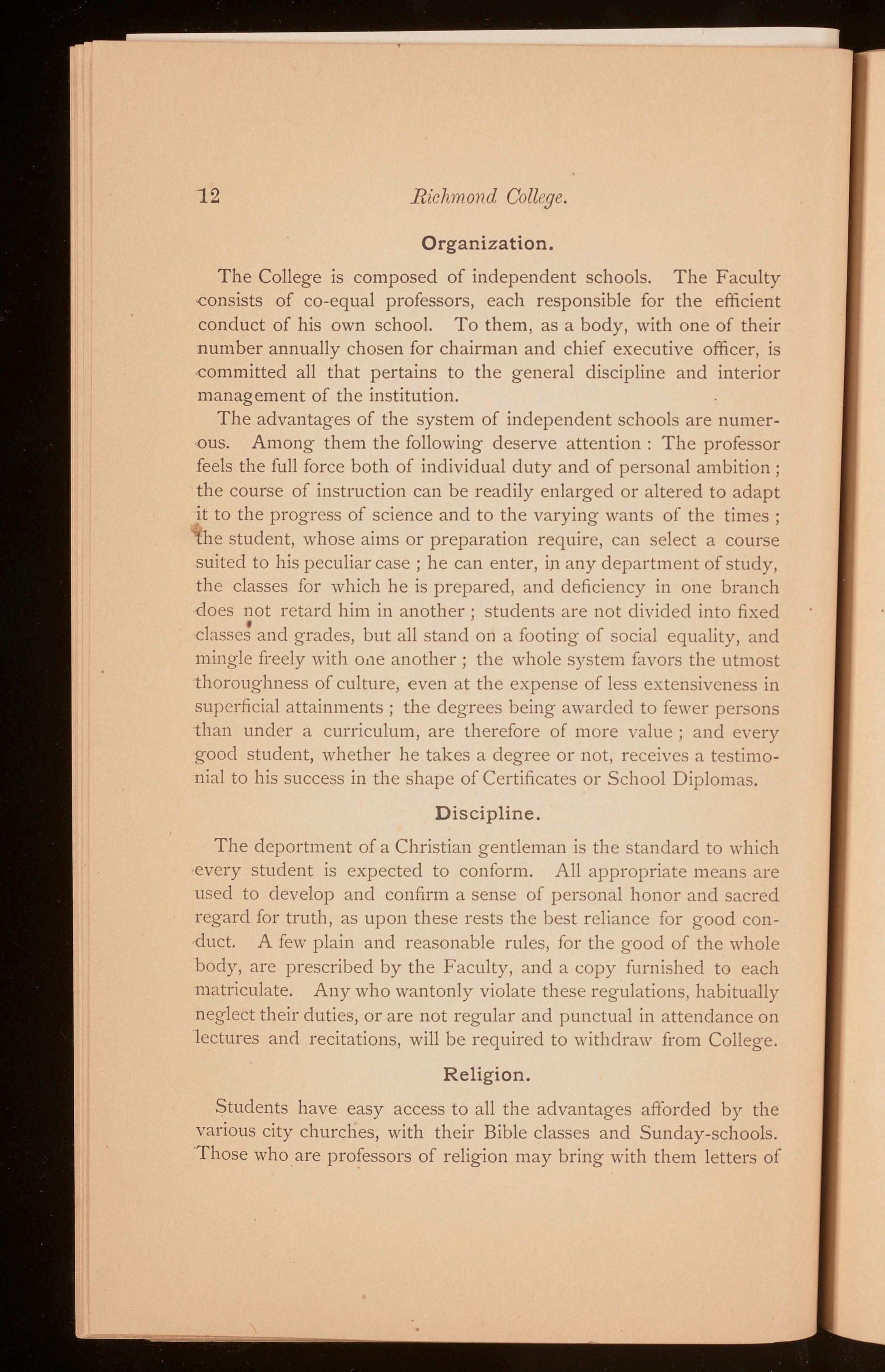
12 Richmond College.
Organization.
The College is composed of independent schools. The Faculty <:onsists of co-equal professors, each responsible for the efficient conduct of his own school. To them, as a body, with one of their number annually chosen for chairman and chief executive officer, is committed all that pertains to the general discipline and interior management of the institution.
The advantages of the system of independent schools are numerous. Among them the following deserve attention : The professor feels the full force both of individual duty and of personal ambition; the course of instruction can be readily enlarged or altered to adapt it to the progress of science and to the varying wants of the times ; the student, whose aims or preparation require, can select a course suited to his peculiar case; he can enter, in any department of study, the classes for which he is prepared, and deficiency in one branch does not retard him in another ; students are not divided into fixed classeJ and grades, but all stand on a footing of social equality, and mingle freely with o,1e another ; the whole system favors the utmost thoroughness of culture, even at the expense of less extensiveness in superficial attainments ; the degrees being awarded to fewer persons than under a curriculum, are therefore of more value ; and eyery good student, whether he takes a degree or not, receives a testimonial to his success in the shape of Certificates or School Diplomas.
Discipline.
The deportment of a Christian gentleman is the standard to which every student is expected to conform. All appropriate means are used to develop and confirm a sense of personal honor and sacred regard for truth, as upon these rests the best reliance for good conduct. A few plain and reasonable rules, for the good of the whole body, are prescribed by the Faculty, and a copy furnished to each matriculate. Any who wantonly violate these regulations, habitually neglect their duties, or are not regular and punctual in attendance on lectures and recitations, will be required to withdraw from College.
Religion.
Students have easy access to all the advantages afforded by the various city churches, with their Bible classes and Sunday-schools. Those who are professors of religion may bring with them letters of

commendation, and, without severing their ecclesiastical connections at home, attach themselves while here to some church, so as to have the sympathy and care of a pastor. The daily duties of the College are opened with brief devotional exercises, conducted by one of the professors ; and prayer-meetings, conducted by the students themselves, are held twice or oftener every week. Attendance on religious exercises is entirely voluntary, as experience has shown that such a course is best in its results.
The students maintain in active operation a Young Men's Christian Association, which, besides its influence in the College, provides work for its members in conducting religious services or teaching Sunday classes at the State Penitentiary, the City Almshouse, Confederate Soldiers' Home, and several mission stations in the suburbfk They have also had addresses during the year from a number of able and earnest men, and a sermon in the chapel once a month.
Library.
The Library is handsomely furnished, thoroughly comfortable, and conducted so as to provide the highest inducements to literary and scientific research. There are eleven thousand six hundrea volumes, all accessible under liberal regulations. The lists of Reference Works are especially ample. Liberal provision is made to secure to professors and students the latest and best works in every department. For the full enjoyment of this elegant hall, with its ample resources, there is no extra charge.
Reading-Room.
The Reading-Room is supplied with the best dailies, weeklies, and monthlies. Sixty magazines, and all leading newspapers, comprising the best literary. scientific, educational, and religious publications of America, are subscribed for regularly. To these are added all the college magazines and a number of French and German papers. Excellent provision is made for gathering and compiling missionary intelligence, while Bible study is encouraged by placing within the reach of all the most modern helps and the best commentaries.
Museum.
Plans for the thorough equipment of the Museum are maturing. The collection of valuable specimens from our own and foreign lands, is already very attractive to the visitor and stimulating to the student.
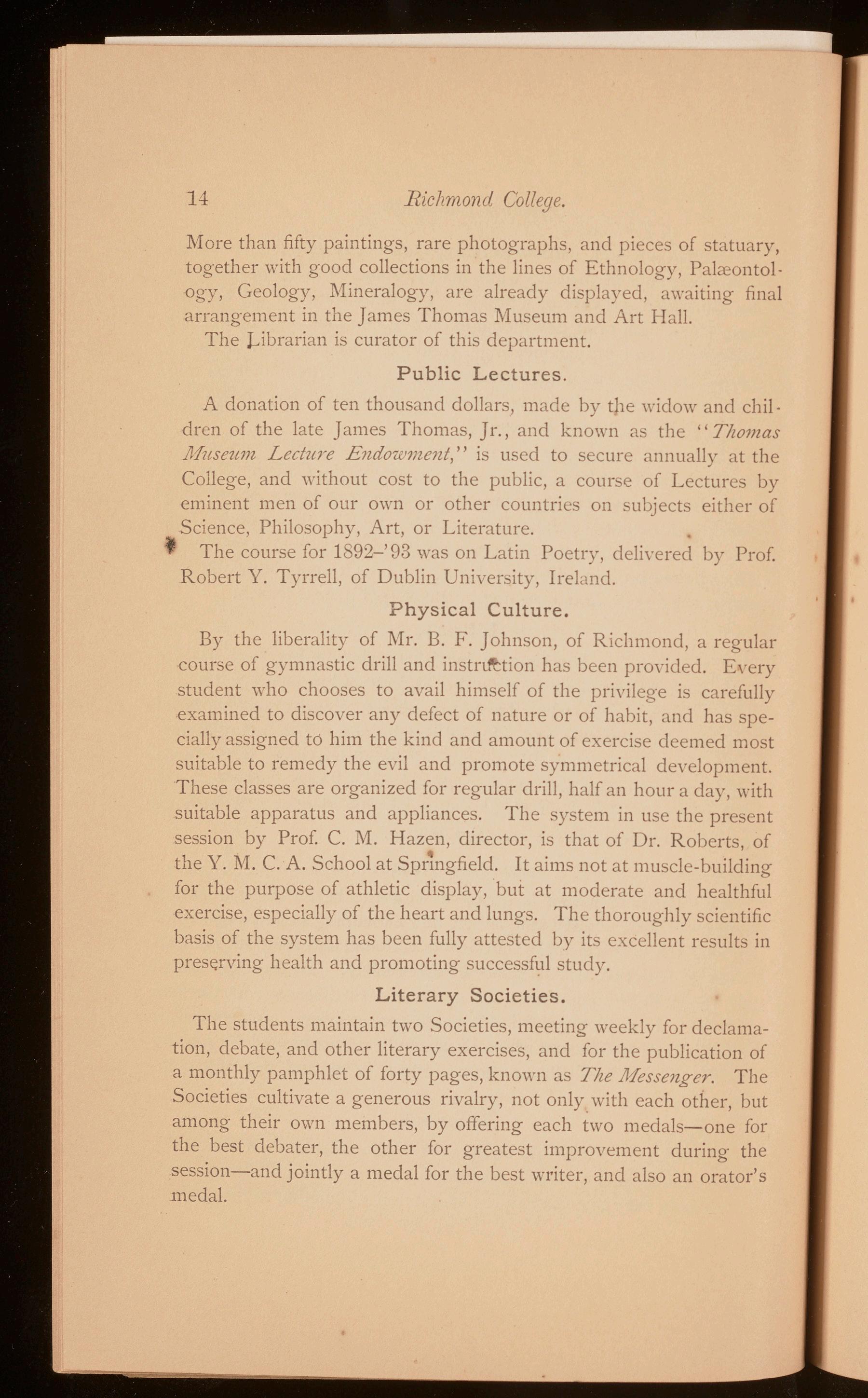
14 Richmond College.
More than fifty paintings, rare photographs, and pieces of statuary, together with good collections in the lines of Ethnology, Palzeontolog:,·, Geology, l\Iineralogy, are already displayed, awaiting final arrangement in the James Thomas l\Iuseum and Art Hall.
The Librarian is curator of this department.
Public Lectures.
A donation of ten thousand dollars, made by the ,,·idow and chil • dren of the late James Thomas, Jr., and kno,Yn as the "Tlzomas /1.fusemn Lecture Endowment," is used to secure annually at the College, and \Yithout cost to the public, a course of Lectures by eminent men of our o\\·n or other countries on subjects either of Science, Philosophy, Art, or Literature.
t The course for 1b92-'93 was on Latin Poetry, cleli\'erecl by Prof. Robert Y. Tyrrell, of Dublin Uniyersity, Ireland.
Physical Culture.
By the liberality of l\Ir. B. F. Johnson, of Richmond, a regular course of gymnastic drill and instn1bion has been pro\'iclecl. E\'ery student who chooses to avail himself of the pri,·ilege is carefully examined to discover any defect of nature or of habit, and has specially assigned to him the kind and amount of exercise deemed most suitable to remedy the evil and promote symmetrical development. These classes are organized for regular drill, half an hour a day, with suitable apparatus and appliances. The system in use the present session by Pro£ C. M. Hazen, director, is that of Dr. Roberts, of the Y. 1\1.C. A. School at Springfield. It aims not at muscle-building for the purpose of athletic display, but at moderate and healthful exercise, especially of the heart and lungs. The thoroughly scientific basis of the system has been fully attested by its excellent results in pres~rving health and promoting successful study.
Literary Societies.
The students maintain two Societies, meeting "·eekly for declamation, debate, and other literary exercises, and for the publication of a monthly pamphlet of forty pages, known as The 11.fessenger. The Societies cultivate a generous rivalry, not only with each other, but among their own members, by offering each two medals-one for the best debater, the other for greatest improvement during the session-and jointly a medal for the best writer, and also an orator's medal.

Geographical and Historical Society.
This Society ,ms organized in 1891 for the purpose of cultivating more accurate acquaintance with the past and present of the land we live in, and particularly for developing the habit of investigation from original sources. Papers of great interest and permanent ,·alue have been produced and published by active members of the Society, and a number of distinguished gentlemen have accepted honorary membership and have favored the Society with addresses. Among those who have thus aided arc Mr. R. A. Brock, Secretary of the Southern Historical Society; Dr. Daniel C. Gilman, President of Johns Hopkins University, and Hon. J. L. M. Curry. The fourth annual address is to be delivered in October by Prof. 0. T. l\Iason, of the Smithsonian Institution.
Trustees, professors, and students are equally entitled to membership, anc.l all three classes are well represented. Meetings occur twice a month. The College has granted a day in the spring to be kno~rn as Historical Day.
University Extension.
Without in any wise committing itself to the popular schemes of "University Extension Work," the College has earnestly desired to extend the privileges of higher culture as far as possible outside of the ranks of regular students. For many years courses of popular lectures have been delivered by sc:~;eralprofessors in Richmond and elsewhere. During next fall and winter these lectures will be under the auspices of the local chapter of Alumni, and will be mana~·cd by a committee consisting of his Honor, Mayor J. Taylor Ellyson, and Messrs. E. R. Chesterman, A. H. Hill, Rev. G. C. Abbitt, and J. Alston Cabell. These gentlemen promise at ·least three courses, times and places to be duly announced, one on Hellenic Poetry by Prof. H. H. Harris, one on some branch of Ast1'onomy or Physics by Prof. Charles H . \Vinston, and one on French Literature of the Seventeenth Century by Prof. F. Vv. Boatwright.

<!cursesof 1Jnstructfon.
!.-School of Latin.
Pro.fessor Harrison.
In this School are taught the Latin Language and Literature, and Roman History. ·
The course of study, embracing four years, with daily recitations throughout, is indicated by the text-books used in the several classes. Students entering the school will be classed according to their previous preparation. For the lowest classes there is required such acquaintance with the elements of Latin grammar as will enable one to begin to translate with profit.
The JUNIOR Class (both sections) is persistently drilled in the forms and the syntax of the language, with due attention to quantity. The INTERMEDIATE and SENIOR Classes continue to give needful attention to grammatical principles, while they are required to attain a good vocabulary and to imbibe the spirit of Latin literature by an extensive course of reading, somewhat varied from year to year. In all the classes the student's progress is tested, and his powers of analysis and composition are cultivated by written exercises in rendering English into Latin and Latin into English.
TEXT-BOOKS.
J1mior.-Section I.-C::esar, Sallust (Long's), l\IcCabe's Bingham's Latin Grammar. Section IL-Virgil, Cicero's Orations (Chase and Stuart's), McCabe's Bingham's Grammar. For Reference: Baird's Clasical l\Ianual.
.lntermediate.-Cicero de Senectute et de Amicitia (Long's), Horace (l\Iacleane's), Livy (Chase and Stuart's), Gildersleeve's Latin Grammar (last edition). Bennett's First Latin Writer.
Senior.-Cicero, Ep. ad Div., Cic. de Oratore, Crowell's Selections from Latin Poets, Terence (Fleckheisen's), Pla11tus, Juvenal (Leverett's), Tacitus, original exercises, Bennett's Second Latin \,Vriter. For Reference: Zumpt's and Gildersleeve's Grammars, Harper's Latin Dictionary (Andrew's Freund), Anthon's Classical Dictionary.
Roman History.-Leighton's; Long's Ancient Atlas.
Roman Literature.-Bender's.
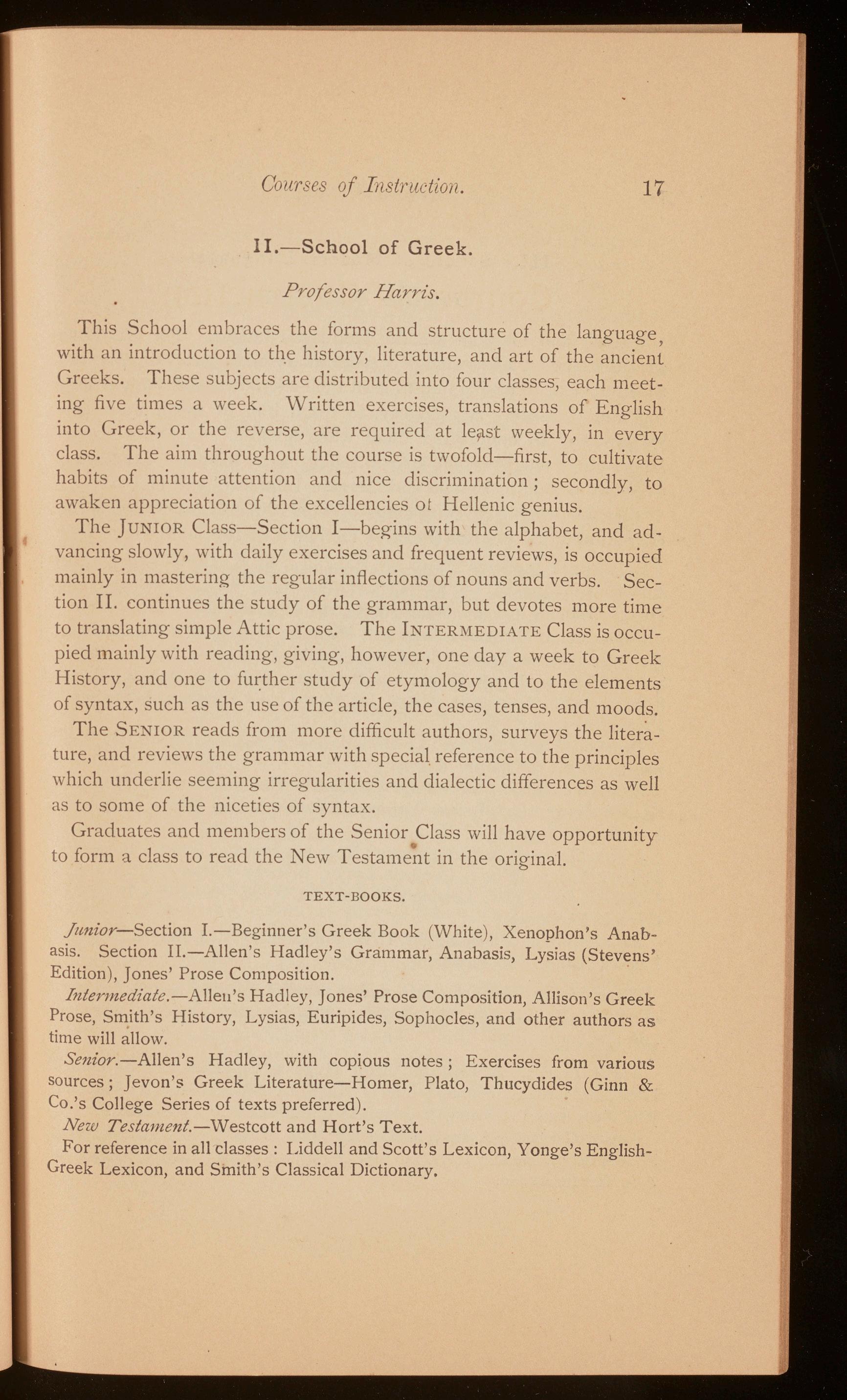
IL-School of Greek.
Professor I-Iarris.
This School embraces the forms and structure of the language, with an introduction to th e history, literature, and art of the ancient Greeks. These subjects are distributed into four classes, each meeting five times a week. \Vritten exercises, translations of English into Greek, or the reverse, are required at leflst weekly, in every class. The aim throughout the course is twofold-first, to cultivate habits of minute attention and nice discrimination ; secondly, to awaken appreciation of the excellencies ot Hellenic genius.
The JUNIOR Class-Section I-beg-ins with the alphabet, and advancing slowly, with daily exercises and frequent reviews, is occupied mainly in mastering the regular inflections of nouns and verbs. Section II. continues the study of the grammar, but devotes more time to translating simple Attic prose. The INTER::-IEDIATEClass is occupied mainly with reading, giving, however, one clay a week to Greek History, and one to further study of etymology and to the elements of syntax, such as the use of the article, the cases, tenses, and moods.
The SENIOR reads from more difficult authors, surveys the liter~ture, and reviews the grammar with special reference to the principles which underlie seeming irregularities and dialectic differences as well as to some of the niceties of syntax.
Graduates and members of the Senior Class will have opportunity to form a class to read the ew Testament in the original.
TEXT-BOOKS.
Jnnior-Section I.-Beginner's Greek Book (White), Xenophon's Anabasis. Section IL-Allen's Hadley's Grammar, Anabasis, Lysias (Stevens' Edition), Jones' Prose Composition.
Intermediate.-Alleu's Hadley, Jones' Prose Composition, Allison's Greek Prose, Smith's History, Lysias, Euripides, Sophocles, and other authors as time will allow.
Senior.-Allen's Hadley, with copious notes; Exercises from various sources; Jevon's Greek Literature-Homer, Plato, Thucydides (Ginn & Co.'s College Series of texts preferred).
New Testament.-\Vestcott and Hort's Text.
For reference in all classes: Liddell and Scott's Lexicon, Yonge's EnglishGreek Lexicon, and Smith's Classical Dictionary.

18 Richmond College.
II £.-Scho ol of Mo dern Languages.
Professor Boatwright.
French and German are the languages taught. The aim is to give the student a knowledge of vocabulary and grammatical structure sufficient to enable him to read their literature with understanding and pleasure. Secondarily, to teach him to speak these languages, and to understand them when spoken. In junior classes language is taught as an art ; in senior, as a science. Increasing attention is paid to French and German Literature and History.
The following is a conspectus of work actually clone during the current session, so far as it can be exhibited by text-books :
FRENCH-jimior Class.-Edgren's Grammar; Beginner's Book in French, Doriot; L'Expedition de La Jeune-Hardie, Jules Yerne; L'Evasion dn Due de Beaufort, Dumas ; Fables de La Fontaine, Moriarty.
Senior Class.-Edgren's Grammar, Part II. ; Grandgent's Composition, Part III., based on Dumas' Le Siege de Berlin; Le Mare au Diable, George Sand; Hemani, Victor Hugo; Les Precieuses Ridicules, l\fol1ere; Lyrics from Beranger, Lamartine, Hugo, De Musset, and Gautier; Saintsbury's French Literature.
Parallel.-Life of Moliere; Le Misanthrope; L' Avare; L'Ecole des Femmes ; L'Ecole des Maris ; Essays.
GERMAN-jimior Class.-First Lessons in German, Harris; First and Second Conversation Books, Worman; Bilderbuch ohne Bilder, Andersen; L' Arrabiata, Heyse.
Senior Class.-Brandt's Grammar; Exercises based on Storm's Immense; Heine's Poems, \Vhite; Goethe's Lyrics, Reineke Fuchs, Hermann und Dorothea, .and Faust; Lessing's Nathan der \Veise ; Hosmer's History of German Literature.
Parallel.-Life of Lessing, by T. W. Rolleston; J. R. Lowell's Essay on Lessing; Minna von Barnhelm.
Examination requirements make parallel reading as much a part of the course as any class-work. The parallel work for 1893-' 94 will be as follows :
Senior Frenclt.-A study of Victor Hugo as representative of French Literature in XIX. century; Life of Hugo, by Frank Marzials; Hemani, Ruy Blas; Hugo's Lyrics; Bug Jargal; La Chute in Les Miserables.
Senior German.-A study of Goethe; Life of Goethe, by James Sime; Meisterwerke, Heath ; Hermann und Dorothea; Faust ; English version of Aus Meinem Lebeu.

Courses of Instruction. 19
During the session 1892-'93 a course of eight public lectures was given on the history of German literature. A similar course on French literature will be delivered in the autumn of 1893.
The College library, besides containing much French and German literature, also regularly supplies students of this school with Le Figaro, Dalteim, Modern Language Notes, and copies of other similar periodicals.
IV.-School of English.
Professor Pollard.
The objects of the School are : (1) to give the student a practical mastery of the English language in speaking and writing ; (2 ) to gi\'e a knowledge of the history of the literature that has been enshrined in the English language, and of the people among whom that literature has been mainly developed ; (3) to cultivate a taste for the best and the most beautiful that has been written, and impart, as far as possible, that literary judgment by which every sentence, every figure, every paragraph, every production may be tested ; (4) to make the English tongue the means of leading the student on to a creditable knowledge of comparative philology and of the science of language.
The JUNIOR Class studies in the first half session Higher English Grammar, giving special attention to etymology and grammatical analysis ; in the second half session, Rhetoric, with particular reference to clear and forcible expression in speaking and writing. Lessons in Orthoepy are given every week, for the purpose of pointing out to students any errors of pronunciation, and making them acquainted with the best usage in this country and England.
The INTERMEDIATEClass studies the histories of English literature and of the English people, and pursues a course of reading in standard authors, with constant application of the grammatical and rhetor ical principles previously learned. The opportunity is embraced for helping the student to acquire the art of good reading.
The SENIOR Class studies Anglo-Saxon and Early English during first half session ; and during the second, traces the relation of our language to other tongues, and its growth from its earliest stage to its present forms and constructions, and pursues as extensive a course in literature as time will allow.

20 Richmond College.
In all the classes exercises in Composition are required, and are criticised in the class-room, for the double purpose of stimulating students to their best endeavors, and giving to all the benefit of the criticisms on each.
Students who, without attendance upon the class below, propose · to join the Intermediate or Senior Class, must stand at the beginning of the session such an examination as will show that they are prepared for the class to which they wish to be admitted.
TEXT-BOOKS.
Junior.-Meiklejohn's English Language, Bain's Higher English Grammar, Abott's How to ·write Clearly, and Scott's Marmion.
Intennediate.-Bain's Composition and Rhetoric, Montgomery's Leading Facts of English History compared with Green's Short History of English People, Stopford Brooke's History of English Literature, l\Iacaulay's Essays on Milton and Bunyan.
Senior.-Lounsbury's History of English Language, Herbert Spencer's Philosophy of Style, Peile's Philology, Whitney's Life and Growth of Language, i\Iinto's Prose Literature with critical study of Macaulay and Carlyle.
For Re.ference.-Skeat's Etymological Dictionary ; American Dictionaries-Webster, Worcester, and Century; English-Stormonth, and Imperial Lexicon.
V.-School of Mathematics.
Professor Gaines.
This School offers a course of pure Mathematics extending over four years or divided into four classes. The work of the lowest class presupposes a thorough knowledge of Arithmetic and of Elementary Algebra through simple Equations.
The aim of the course is not so much to make specialists of a few enthusiastic students as to give thorough mental discipline to the many. It is intended to increase the student's power of independent, earnest, honest investigation-to encourage the habit of stating with clearness and exactness his own convictions, and of giving logically his reasons for them. Throughout the entire course numerous exercises and original problems are given to stimulate the student's confidence in his own reasoning, and to cultivate his power of invention.
But while mental development is the chief aim, still it is believed that the student who rn.asters the course given below will have realized something of the power and elegance of the science, and the

Courses of Instl'uction.
magnitude of the field that lies before him, and if he should wish to pur:,ue the subject further will have acquired sufficient knowledge of Mathematics and mathematical methods to be able to continue his studie independently. It will be seen that in the work of the first three years are included nearly all the subjects found in the usual ,college course.
Junior-Section I.-Algebra through Quadratic Equations and Plane Geometry.
Text-Books: Hall and Knight's Elementary Algebra, Chauvenet's Geometry. Section IL-Algebra, beginning with Quadratic Equations, Solid Geometry, Plane Trigonometry.
Text-Books: C. Smith's Algebra, Chauvenet's Geometry, Wentworth's Trigonometry.
Intermediate -Conic Sections, including the methods of trilinear and tangential co-ordinates, and Theory of Equations, including Determinants.
Text-Books: C. Smith's Conic Sections, Lectures on Theory of Equations ; for reference, Burnside and Panton.
Senior.-Differential and Integral Calculus, with numerous applications to the theory of maxima and minima, the theory of ·curves, rectification of curves, determination of areas and volumes, problems in mechanics, &c. Calculus of Variations and introductory lessons in l\Iodern Higher Algebra .and in Quaternions.
As parallel work, the students are required to read a short history of Mathematics, in order that they may know something of the deyelopment of the science and of the mathematicians who have principally contributed to this development.
Text-Books: Todhunter's Differential Calculus, Williamson's Integral Calculus, Salmon's Modern Higher Algebra, the course bemg supplemented by notes.
The subject of Land Surveying is taught in an additional class, open to students who have finished the second junior section. Much of the time devoted to this class is spent in the field, thus giving the student familiarity with the instruments used and considerable practice in doing the field work.
Text-Book: Gillespie's Land Surveying.
VI.-School of Physics. Professor Winston.
The School of Physics embraces the several s·ubjects usually grouped under this title, or under the practically equivalent name,
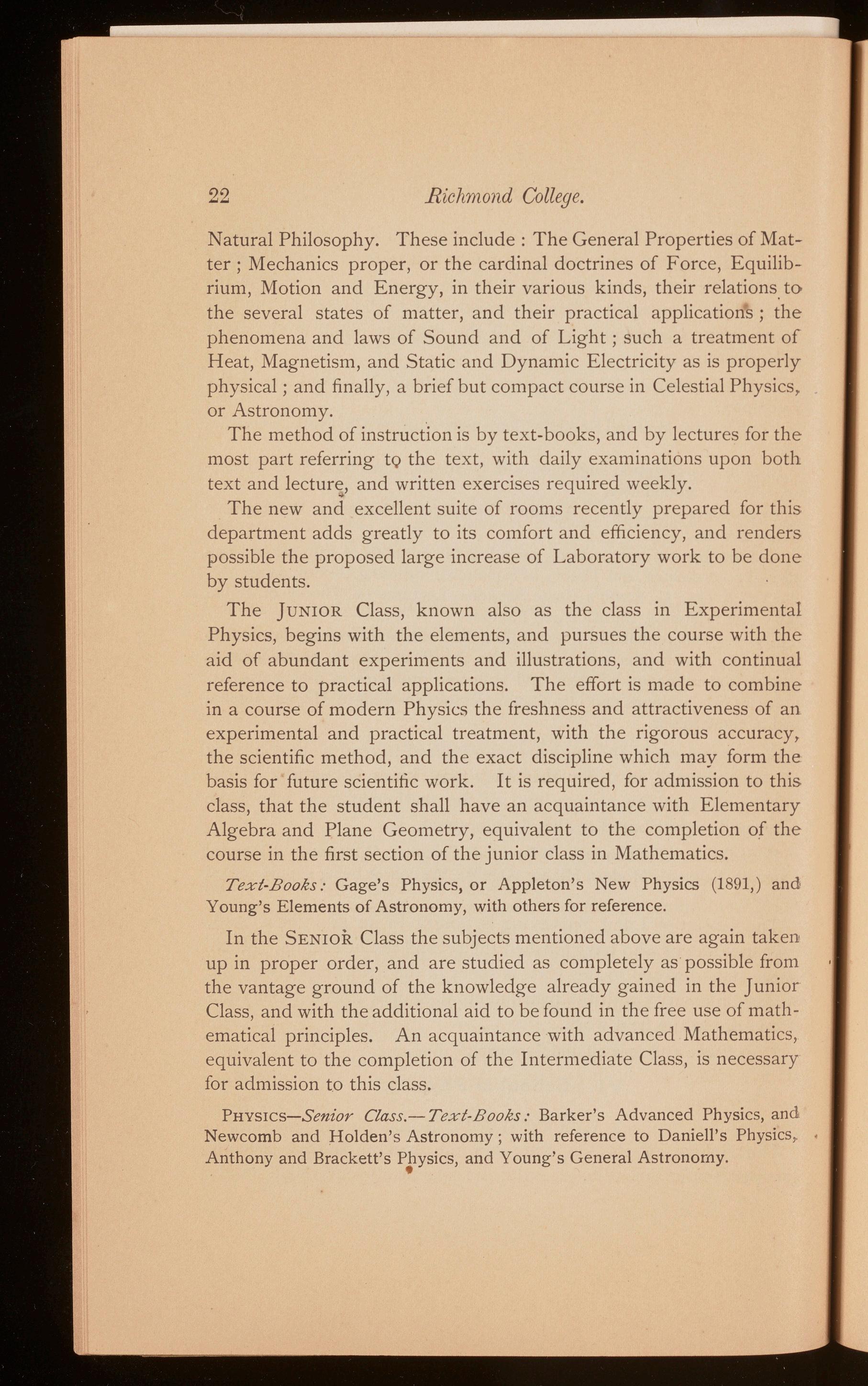
22 Richmond College.
Natural Philosophy. These include : The General Properties of Matter; Mechanics proper, or the cardinal doctrines of Force, Equilibrium, Motion and Energy, in their various kinds, their relations _ to the several states of matter, and their practical applications ; the phenomena and laws of Sound and of Light ; such a treatment of Heat, Magnetism, and Static and Dynamic Electricity as is properly physical; and finally, a brief but compact course in Celestial Physics, or Astronomy.
The method of instruction is by text-books, and by lectures for the most part referring tQ the text, with daily examinations upon both text and lectur<:, and written exercises required weekly.
The new and excellent suite of rooms recently prepared for this department adds greatly to its comfort and efficiency, and renders possible the proposed large increase of Laboratory work to be done by students.
The JUNIOR Class, known also as the class in Experimental Physics, begins with the elements, and pursues the course with the aid of abundant experiments and illustrations, and with continual reference to practical applications. The effort is made to combine in a course of modern Physics the freshness and attractiveness of an experimental and practical treatment, with the rigorous accuracy, the scientific method, and the exact discipline which may form the basis for future scientific work. It is required, for admission to this class, that the student shall have an acquaintance with Elementary Algebra and Plane Geometry, equivalent to the completion of the course in the first section of the junior class in Mathematics.
Text -Books: Gage's Physics, or Appleton's New Physics (1891,) and Young's Elements of Astronomy, with others for reference.
In the SENIOR Class the subjects mentioned above are again taken up in proper order, and are studied as completely as possible from the vantage ground of the knowledge already gained in the Junior Class, and with the additional aid to be found in the free use of mathematical principles. An acquaintance with advanced Mathematics, equivalent to the completion of the Intermediate Class, is necessary for admission to this class.
PHYSICS-Senior Class.-Text-Books: Barker's Advanced Physics, and Newcomb and Holden's Astronomy; with reference to Daniell's Physics , Anthony and Brackett's Physics, and Young's General Astronomy . •
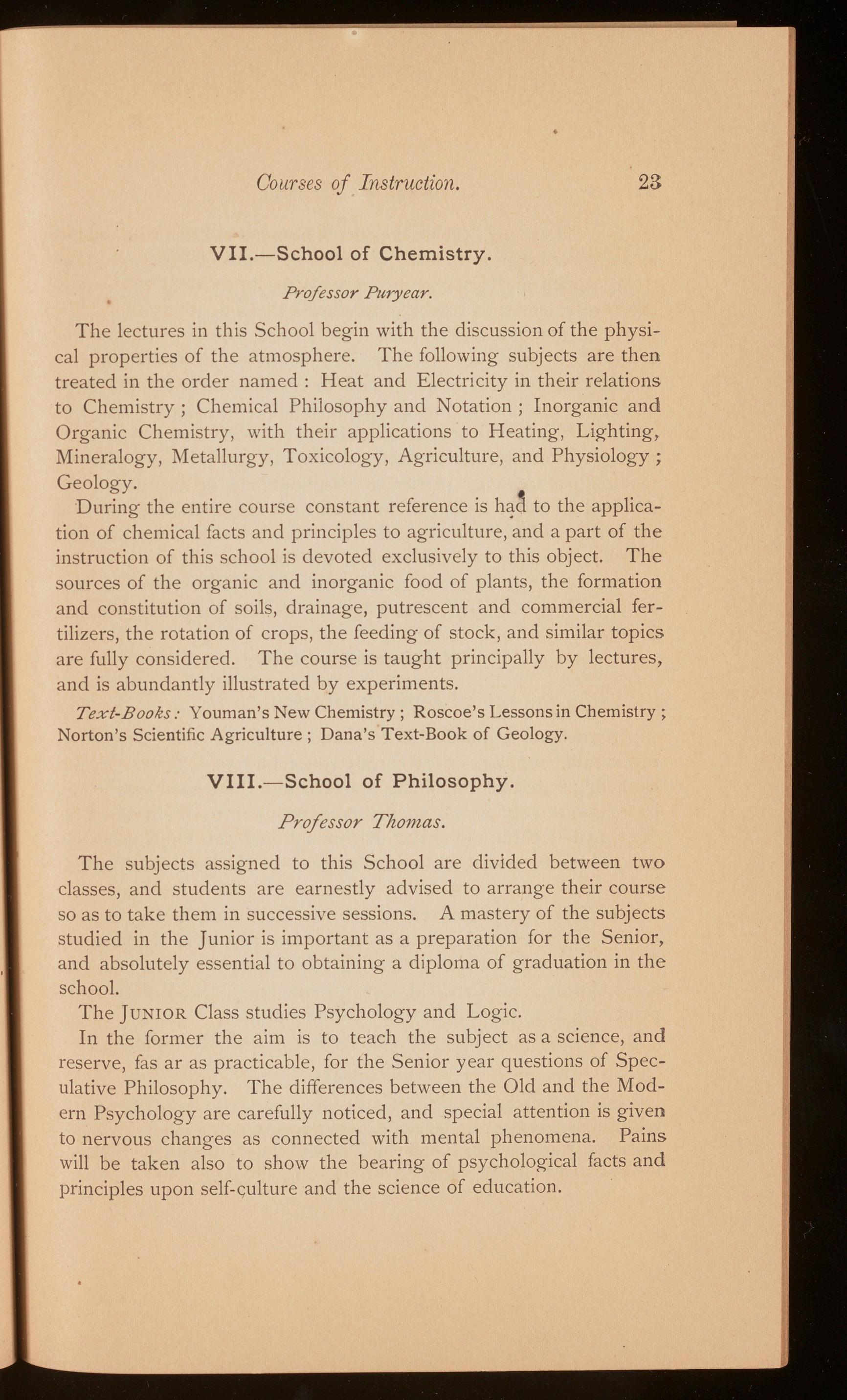
Courses of Instruction.
VIL-School of Chemistry.
Professor Puryear.
The lectures in this School begin with the discussion of the physical properties of the atmosphere. The following subjects are then treated in the order named : Heat and Electricity in their relations to Chemistry; Chemical Phiiosophy and Notation; Inorganic and Organic Chemistry, with their applications to Heating, Lighting, Mineralogy, Metallurgy, Toxicology, Agriculture, and Physiology; Geology.
During the entire course constant reference is to the application of chemical facts and principles to agriculture, and a part of the instruction of this school is devoted exclusively to this object. The sources of the organic and inorganic food of plants, the formation and constitution of soils, drainage, putrescent and commercial fertilizers, the rotation of crops, the feeding of stock, and similar topics are fully considered. The course is taught principally by lectures, and is abundantly illustrated by experiments.
Text-Books: Youman's New Chemistry; Roscoe's Lessons in Chemistry; Norton's Scientific Agriculture; Dana's Text-Book of Geology.
VIII.-School of Philosophy.
Professor Thomas.
The subjects assigned to this School are divided between two classes, and students are earnestly advised to arrange their course so as to take them in successive sessions. A mastery of the subjects studied in the Junior is important as a preparation for the Senior, and absolutely essential to obtaining a diploma of graduation in the school.
The JUNIOR Class studies Psychology and Logic.
In the former the aim is to teach the subject as a science, and reserve, fas ar as practicable, for the Senior year questions of Speculative Philosophy. The differences between the Old and the Modern Psychology are carefully noticed, and special attention is given to nervous changes as connected with mental phenomena. Pains will be taken also to show the bearing of psychological facts and principles upon self-culture and the science of education.

24 Richmond College.
Logic, including both the Deductive and the Inductive, is studied as extensively and as thoroughly as the time at command will allow.
The SENIOR Class is occupied with the History of Philosophy and the principles of Ethics and Political Economy.
In the first the aim is to trace the general course of philosophic thought, to mark the characteristic doctrines of the distinctive schools, ancient and modern, and to examine critically the more important doctrines of the most influential representatives of some of these schools with special attention to questions now at issue.
Much time is devoted to Ethics, theoretical and practical. Among the matters re~eiving particular attention may be mentioned the different modes of investigation which have been pursued, the more important ethical theories which have been advanced, the progress of ethical thought, and the value of the Christian ethics.
Less time can be given to the study of Political Economy, but enough to gain a good knowledge of the elements of this yaluable science.
IX.-School of Law.
Professor Gregory.
This School, established in 1870 and continued with slight interruption till 1882, was in 1890 firmly re-established. The location is eminently suited for combining practical with theoretical instruction, by reason of easy access to the numerous courts-Federal, State, Municipal-held in the city of Richmond, and the large and wellselected libraries-law and miscellaneous-of the State and the College.
The School is organized to provide for the student a complete course in the general principles of the law and their applications. To this end are taught the following subjects, to-wit : The Common Law, Statute Law, Criminal Law, Commercial Law, Equity Jurisprudence, International La,v, Constitutional Law.
The School is divided into two classes, with the following
TEXT·BOOKS.
Junior Class.-Blackstone's Commentaries, Minor's Institutes of Common and Statute Law (Vol. I.), Smith on Contracts, Smith's Mercantile Law, Barton's Law Practice (Vols. I. and II.), Woolsey's International Law, Miller on the Constitution of the United States.

Courses of Instruction. 25
Senior Class.-Minor's Institutes of Common and Statute Law (Vol. II.), Greenleaf's Evidence (Vol. I.), Adams' Equity, Barton's Chancery Practice (Vols. I. and II).
For Reference.-Code of Virgina, 1887, and Revised Statutes of the United States (second edition, 1878) and Supplements.
The instruction is thorough, and is given through text-books and lectures, with daily oral examinations. The course is designed for two sessions, and the student is advised to devote that time to it. But he may receive the degree of Bachelor of Law in one session if he attain a competent knowledge of all the subjects taught in the School, tested by the regular examinations.
Certificates of Proficiency are conferred upon those who attain a sufficient knowledge of International and Constitutional Law to entitle them thereto; and, when conferred, dispense with further study of those subjects to take the degree of Bachelor of Law.
The hours for meeting the classes are so arranged as to allow attendance by law students on classes in the academic department, and by academic students on those of the law course.
Tuition fee for either one of the classes, $40 ; for both of them, $70.
The cost of all the text-books needed for the entire course is about $65.

1Reportsanb Bwarbs.
Monthly Reports.
As may be seen from the foregoing statement, instruction is conveyed by the use of approved text-books, supplemented by oral explanations and additions, in some cases by more formal lectures, and in most of the classes by exercises to be written and carefully corrected. In every class the student is questioned on the assigned portion of the text or the previous lecture. An account of the value of these recitations and exercises is kept by the professor, and the average standing for each month is calculated and entered of record for reference in determining his right to any of the honors of the institution.
To the parent or guardian is sent, monthly, a transcript of this record of class-standing, with a statement of the absences of the student from his classes, and such other information as may be deemed important. By the prompt and judicious attention of those to whom they are addressed, these reports may be made of great value in promoting improvement and sustaining a just discipline.
Examinations.
Besides the daily questioning, every class is subjected to two or more general examinations conducted in writing. The Intermediate Examination, embracing in its scope the first half of the course, is held about the middle of the session. The Final Examination, held near the close of the session, embraces the subjects treated in the second half. In Senior classes, however, examinations are not limited to what has been explicitly contained in the course of instruction, but may embrace passages or problems that have not been taken up in the class-room, together with an oral review of the whole · course taught in the School, as searching and extensive as the professor may deem necessary.
0
For these examinations a series of questions, with certain numerical values attached, is prepared for each class. The answers furnished by each student are carefully valued, and this valuation is
Reports and Awards.
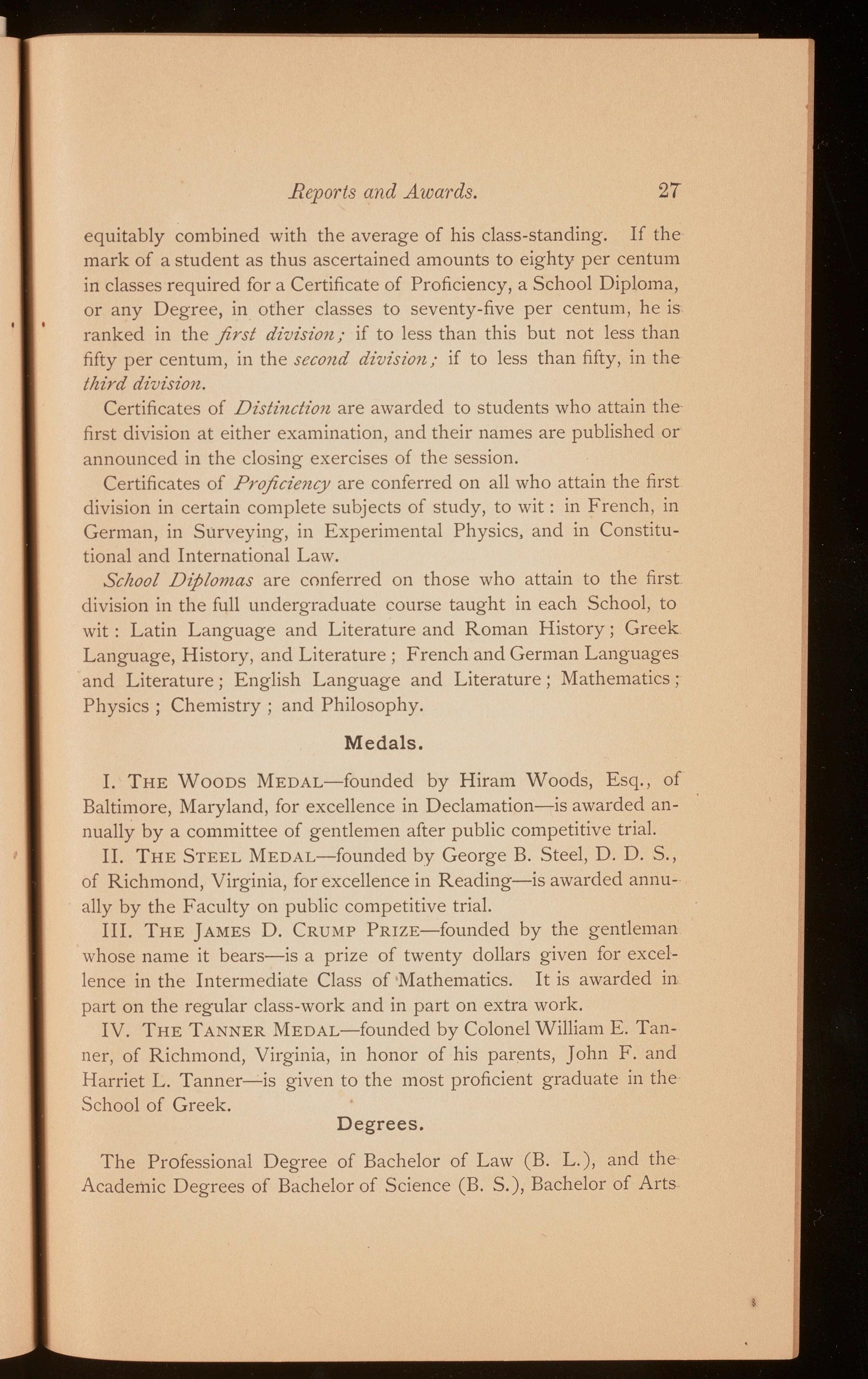
27
equitably combined with the average of his class-standing. If the mark of a student as thus ascertained amounts to eighty per centum in classes required for a Certificate of Proficiency, a School Diploma, or any Degree, in other classes to seventy-five per centum, he is ranked in the first division; if to less than this but not less than fifty per centum, in the second division; if to less than fifty, in the tlzird division.
Certificates of Distinction are awarded to students who attain the first division at either examination, and their names are published or announced in the closing exercises of the session.
Certificates of Proficiency are conferred on all who attain the first division in certain complete subjects of study, to wit: in French, in German, in Surveying, in Experimental Physics, and in Constitutional and International Law.
Sc/tool Diplomas are conferred on those who attain to the first division in the full undergraduate course taught in each School, to wit : Latin Language and Literature and Roman History; Greek Language, History, and Literature; French and German Languages and Literature; English Language and Literature; Mathematics; Physics ; Chemistry ; and Philosophy.
Medals.
I. THE WOODS MEDAL-founded by Hiram Woods, Esq., of Baltimore, Maryland, for excellence in Declamation-is awarded annually by a committee of gentlemen after public competitive trial.
II. THE STEEL MEDAL-founded by George B. Steel, D. D. S., of Richmond, Virginia, for excellence in Reading-is awarded annually by the Faculty on public competitive trial.
III. THE JAMES D. CRUMP PRIZE-founded by the gentleman whose name it bears-is a prize of twenty dollars given for excellence in the Intermediate Class of Mathematics. It is awarded in part on the regular class-work and in part on extra work.
IV. THE TANNER MEDAL-founded by Colonel William E. Tanner, of Richmond, Virginia, in honor of his parents, John F. and Harriet L. Tanner-is given to the most proficient graduate in the School of Greek.
Degrees.
The Professional Degree of Bachelor of Law (B. L. ), and the Academic Degrees of Bachelor of Science (B. S. ), Bachelor of Arts

Richmond College.
(B A.), and Master of Arts (M. A.), are conferred by the Trustees on recommendation from the Faculty. They cannot be given either in course or as honorary degrees.
1. FoR BACHELOR OF LAW is required Graduation on all the subjects included in the Law School , with some proficiency in general education.
2. FoR BACHELOR OF SCIENCE are required Graduation in the Schools of Mathematics, Physics, and Chemistry, Proficiency in French or German, and Distinction at both Intermediate and Final Examinations in Intermediate English and in Junior Philosophy.
3. FOR BACHELOROF ARTS are required Graduation in the five Schools of Latin, Greek (or Modern Languages), English, Chemistry (or Experimental Physics), and Philosophy, and Distinction at both Intermediate and Final Examinations in the Intermediate Class of Mathematics.
4. FoR MASTER OF ARTS is required Graduation in all of the -eight academic Schools.
The candidate for any of these degrees is also required to submit, for the approval of the Faculty, an oration or essay composed by himself, which he shall deliver in public at the close of the sess10n, if so directed.
Honors Awarded at Commencement.
JUNE 22, 1893.
MEDALISTS.
·"WOODS" MEDAL-DECLAMATION. H. C. BURNETT, JR., Richmond, Va. "STEEL" MEDAL-READING .... H. C. BURNETT.JR., Richmond, Va. "CRUMP" PRIZE-MATHEMATICS.. \\' ALTER D. BLAIR, Richmond, Va. "'TANNER" MEDAL-GREEK ..... FRANK C. JONES, Bonham, Tex.
CERTIFICATESOF PROFICIENCY.
In French (Fr.), German (Ger.), Surveying (Surv.), Experimental Physics (Ex. P.), and Constitutional and International Law (C. I. L.), as follows: John W Bates .... . Richmond, Va. . . Ex. P.
Robert S. Bosher, Jr ... Richmond, Va. . Fr.
Jose M. Cardenas Saltillo, Mexico . Fr. '
Lewis A. Cardozo ... Richmond, Va. . Ex. P.
Charles M. Cooke, Jr. .. Louisburg, N. C. . . Ex. P.
Thomas S. Dunaway, .. Loudoun Co., Va. . Ex. P. w. F. Dunaway, Jr ... Loudoun Co., Va. . Ex. P.
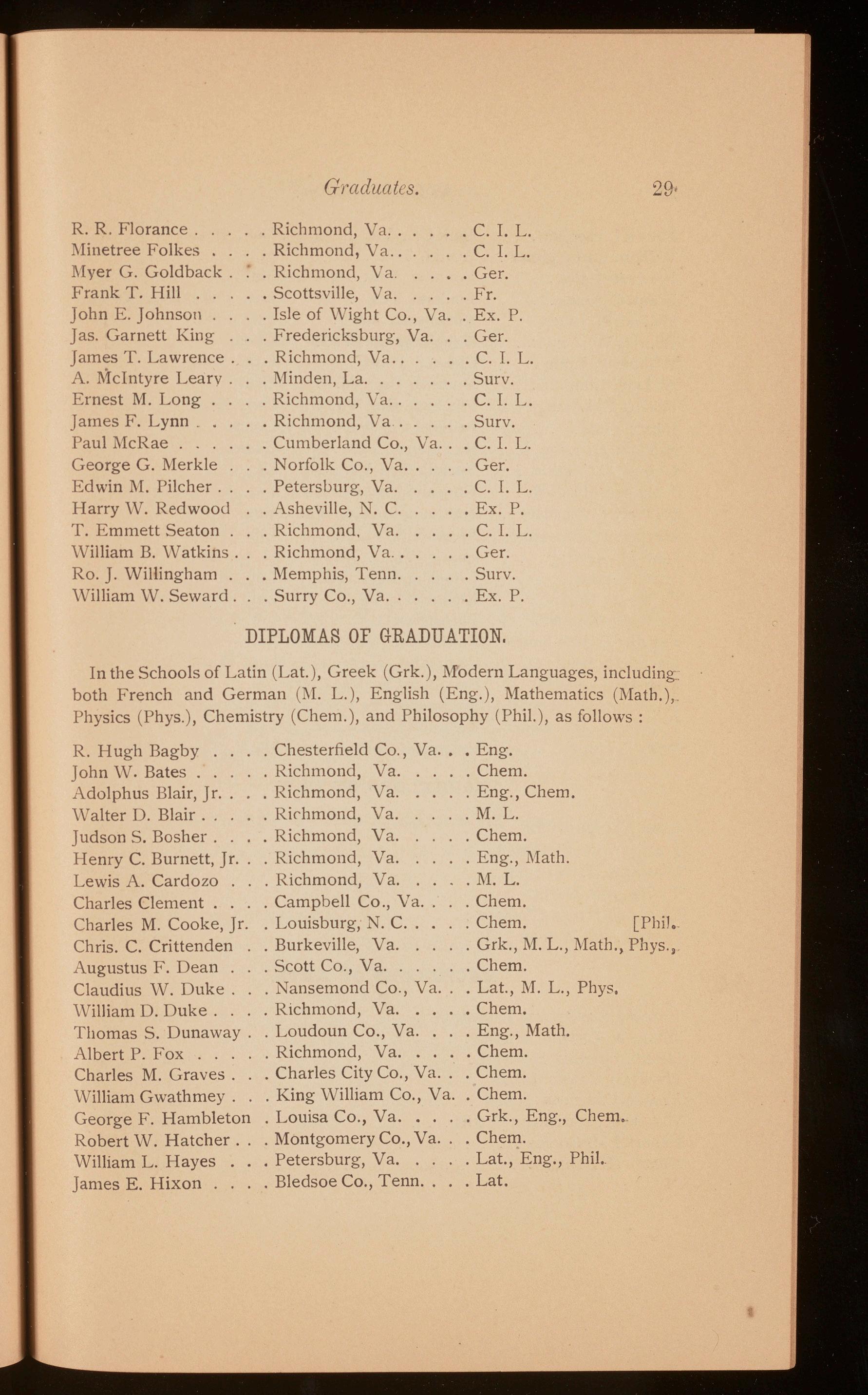
Graduates.
R. R Florance . . Richmond, Va .. . C. I. L. l\linetree Folkes . Richmond, Va .. .C.I.L.
Myer G. Goldback. . Richmond, Va. . Ger.
Frank T. Hill . Scottsville, Va. . Fr.
John E. Johnson . Isle of Wight Co., Va . . Ex. P.
Jas. Garnett King . Fredericksburg, Va. . Ger.
James T. Lawrence . . Richmond, Va .. . C. I. L.
A. McIntyre Learv . . l\1inden, La. . Surv.
Ernest M. Long . Richmond, Va .. . C. I. L.
James F. Lynn . Richmond, Va . . Surv.
Paul l\lcRae . Cumberland Co., Va .. . C.I.L.
George G. Merkle . Norfolk Co., Va .. . Ger.
Edwin l\L Pilcher .. Petersburg, Va. . C. I. L.
Harry \V. Redwood . Asheville, N. C. . Ex. P.
T. Emmett Seaton . Richmond. Va. . C. I. L.
William B. Watkins . . Richmond, Va . Ger.
Ro. J. Willingham . Memphis, Tenn. . Surv.
William W. Seward . . Surry Co., Va .. . Ex. P.
DIPLOMASOF GRADUATION.
In the Schools of Latin (Lat. ), Greek (Grk. ) , Modern Languages, including both French and German (l\I. L.), English (Eng. ), Mathematics (l\Iath.), Physics (Phys. ) , Chemistry (Chem.), and Philosophy (Phil.), as follows:
R. Hugh Bagby . Chesterfield Co., Va .• , Eng.
John W. Bates . . Richmond, Va. . Chem.
Adolphus Blair, Jr .. . Richmond, Va. . Eng , Chem.
Walter D. Blair .. Richmond, Va. M. L.
Judson S. Basher . . Richmond, Va. . Chem.
Henry C. Burnett, Jr .. . Richmond, Va. . Eng., l\fath.
Lewis A. Cardozo . Richmond, Va. . l\L L.
Charles Clement . . Campbell Co., Va . . . Chem.
Charles M. Cooke, Jr. . Louisburg, N. C .. Chem. [Phil • Chris. C. Crittenden . Burkeville, Va. . Grk., M. L., Math., Phys., Augustus F. Dean . Scott Co., Va. . Chem.
Claudius \V. Duke . . Nansemond Co., Va .. . Lat., M. L., Phys, William D. Duke . . Richmond, Va. . Chem.
Thomas S. Dunaway . . Loudoun Co., Va. . Eng., Math. Albert P. Fox . Richmond, Va. . Chem.
Charles M. Graves . . Charles City Co., Va .. . Chem.
William Gwathmey . . King William Co., Va . . Chem.
George F. Hambleton . Louisa Co., Va. . Grk., Eng., Chem.
Robert \V. Hatcher .. . Montgomery Co., Va .. . Chem .
William L. Hayes . Petersburg, Va. Lat., Eng., Phil.
James E. Hixon . Bledsoe Co., Tenn .. . Lat .
;30
Milton J. Hoover .
William Carey James
Fred. A. Jones
Frank C. Jones
William M. Jones . .
Charles W. Lemon .
William F. Long.
A. Don. Louthan
Robert E. Loving.
John E. Loyd . .
William H. Lyne, Jr
George G. l\ferkle
J. Ryland Murdoch .
Herbert L. Norfleet .
Herbert \V. Provence .
John H. Read, Jr.
Ira C. Riddell .
Claiborne Robins.
Leslie B. Samuels
Fayette E. Scanland
David H. Scott ..
Stephen L. Smith .
\,\'. Crump Tucker
William B. Watkins
Peter Winston . . .
JOHN H. DINNEEN .
HAMNER G. FREEMAN
\VARREN H . MERCER .
T. THOMAS MOSBY , .
Richmond College.
Bath Co., Va. Lat., Phil.
. Austin, Tex. M. L. Bonham, Tex. Math. Bonham, Tex. . Lat., Grk., Eng., Phil.
. Richmond, Va. . Eng., Phil.
. Alleghany Co., Va. . . Chem . Chester, Penn. . Grk., Math.
. Madison Co., Va. . Grk.
Fluvanna Co., Va. Lat., Eng. Bedford Co ., Va. . . Chem. Richmond, Va. . Chem.
. Norfolk Co., Va. . . Lat. King and Queen Co., Va. Lat., Grk., Eng., Phil.
. Southampton Co., Va .. Eng.
. Richmond, Va. . Eng., Phys.
. Luray, Va. . . . . . M. L., Eng.
. Goochland Co., Va. Lat., M. L. Richmond, Va. Lat., Eng, Chem . Bardstown, Ky. . Lat., Grk., Eng., Phil.
. Fairfax Co., Va. . Lat Richmond, Va. Lat., M. L., Phil. Fauquier Co., Va. . Lat .
. Richmond, Va. . . 1\I. L. . Richmond, Va. . . Lat.
. Richmond College, Va .. l\fath., Phys., Chem.
BACHELORS OF LAW.
CHARLES MILLER VvAITE

. Richmond, Va.
. Richmond, Va. . Culpeper, Va. .... Giles Co., Va.
LINDSAY C. vVOLFE . Richmond, Va . . Lynchburg, Va.
BACHELORS OF ARTS.
THOMAS SANDFORD DUNAWAY . Loudoun Co., Va.
WILLIAM LUTHER HAYES. . . Petersburg, Va.
MILTON JOSIAH HOOVER. Bath Co., Va.
WILLIAM CAREY JAMES Austin, Tex.
FRANK CAMERONJONES . Bonham, Tex.
vVILLIAMMONTAGUEJONES. . Richmond, Va.
LESLIE B. SAMUELS Bardstown, Ky.
DAVID H. ScoTT . . Richmond, Va.
The Society of Alumni. 31
MAST E RS OF. ARTS .
·CHRISTOPHER CRIDLIN CRITTENDEN .........•
CLAUDIUS WALTER DUKE •..•
The So cie t y o f A lumni

Burkeville, Va.
Nansemend Co., V a.
-consists of all who have received any of the College degrees, and such graduates in one or more Schools, or other students of distin~ guished merit, as may be elected to membership. They meet annually, in connection with the closing exercises of the session, to renew the associations of College life and promote the interests of their Alnza Mater.
OFFICERS.
Pq:sident-R. B. Lee, Richmond, Va.
First Vice-President-W. A. Harris, Ripon, \!Vis.
Second Vice-President-£. B. Hatcher, Norfolk, Va.
Secretary-A. J. Chewning, Richmond, Va.
Treasurer-R. R. Gwathmey, Richmond, Va.
A Local Chapter, composed of Alumni residing in or near the city of Richmond, has been recently organized with Captain Sol. Cutchins, President, and Prof. H. F. Cox, Secretary. Similar chapters will be formed in other localities. Mon., Wed., Frid., Mon., Wed., Thurs., Frid., Mon., Wed., Thurs., Frid.,
Schedule of Examinations for 1894.
[Subject to any minor changes that may be found necessary.] Intermediate.
Jan'y 22-Philosophy, Junior.
" 24-Senior Physics; Mathematics, II. and I.
" 26-English, Senior and Junior.
" 29-Greek-all classes.
" 31-French, Senior and Junior.
Feb'y 1- Intermediate English.
" 2-J unior Physics ; Senior Philosophy.
" 5-Latin-all classes.
" 7-Chemistry.
" 8-German-both classes.
" 9-Intermediate Mathematics.
32 Richmond College. I,:regular.
Senior Mathematics, about March 15th.
French Literature, about March 30th.
Senior and Intermediate Mathematics, about April 15th.
Junior Physics (first part), about April 20th.
German Literature, about April 25th.
Greek History and Literature, about April 30th.
Senior Latin, on History and Literature, about May 5th.
Senior Physics (first part), about May 10th.
Final.
Tues., May 22-Senior and Intermediate Mathematics. Mon., " Wed., "
Frid., June Mon., " Tues., " Wed., "
Frid., " Mon., " Tues., "
Wed., "
Friel., " Mon., "

28-Senior and Intermediate Greek.
30-Mathematics, Junior II (first half).
1-Senior and Intermediate Latin.
4-Senior English.
5-Junior and Senior French and Junior Philosophy.
6-Senior Physics; Greek, Junior II. and I.
8-Mathematics, Junior II. and I (first half).
11-Senior Philosophy; Junior German.
12-Junior and Intermed. English and Sen. German. 13-Chemistry.
15-Latin, Junior II. and I.
18-Junior Physics; and Mathematics, Junior I.

1Requirementsfor Bbtnission.
Session.
The next session opens on Thursday, September 21, 1893, and continues thirty-nine weeks-that is, to the corresponding Thursday in June. The exercises are suspended for three days at Christmas and on two separate days in spring, "Historical Day," for an excursion to some place of special interest, and " Field Day," for competi.tive out-of-door sports.
Students are earnestly advised to be present at the opening when classes am formed and begin regularly the year's woi·k. Any who come later will enter at the disadvantage of having to join classes already more or less advanced.
Selection of Studies.
The system of independent Schools allows the selection for every student of such studies as will be most valuable in qualifying him for his future pursuits; but while allowing such selection, the Faculty hold that the man is more than the occupation, and will always encourage a regular and complete course. To this end they reserve the right to prescribe the studies of any who may be found unprepared for classes higher than the Junior in Latin, English, and Mathematics.
Every one is required to attend at least three Schools, and to adhere throughout the session to the studies selected on his matriculation, unless the Faculty, for satisfactory reasons, allow him to attend a less number, or make an exchange.
Students are assigned to the several classes in a School according to their apparent attainments; but the professor will, at any time, transfer a student to a higher or lower class, when, in his judgment, such a change is desirable.
Matriculation.
Every applicant upon arriving at the College will report promptly to the Chairman of the Faculty. If he has been a student at any
34
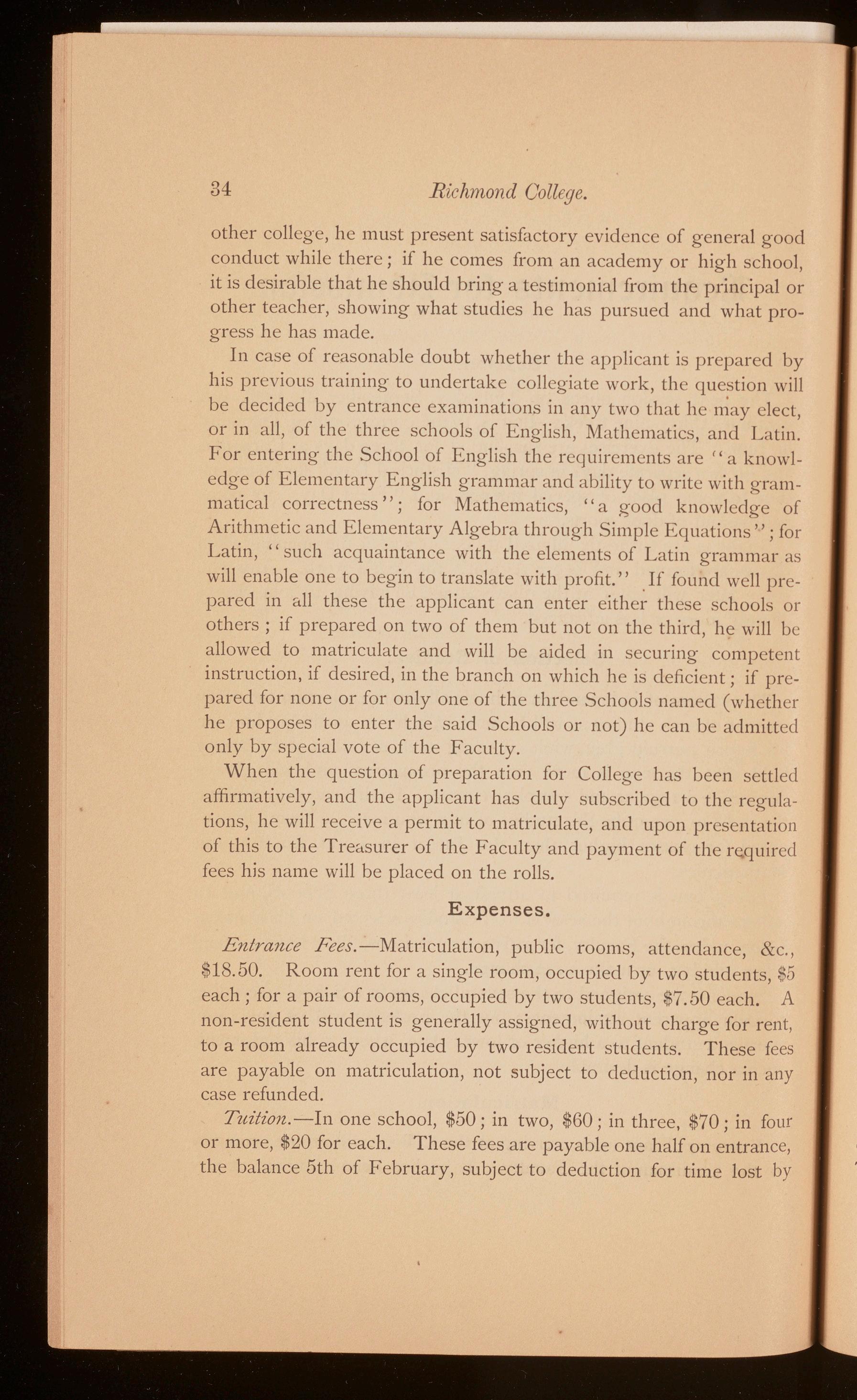
Richmond College.
other college, he must present satisfactory evidence of general good conduct while there; if he comes from an academy or high school, it is desirable that he should bring a testimonial from the principal or other teacher, showing what studies he has pursued and what progress he has made.
In case of reasonable doubt whether the applicant is prepared by his previous training to undertake collegiate work, the question will be decided by entrance examinations in any two that he n~ay elect, or in all, of the three schools of English, Mathematics, and Latin. For entering the School of English the requirements are "a kno\\"ledge of Elementary English grammar and ability to write with grammatical correctness"; for Mathematics, "a good knowledge of Arithmetic and Elementary Algebra through Simple Equations"; for Latin, "such acquaintance with the elements of Latin grammar as will enable one to begin to translate with profit.'' . If found well prepared in all these the applicant can enter either these schools or others ; if prepared on two of them but not on the third, he will be allowed to matriculate and will be aided in securing competent instruction, if desired, in the branch on which he is deficient; if prepared for none or for only one of the three Schools named (whether he proposes to enter the said Schools or not) he can be admitted only by special vote of the Faculty.
When the question of preparation for College has been settled affirmatively, and the applicant has duly subscribed to the regulations, he will receive a permit to matriculate, and upon presentation of this to the Trec1surer of the Faculty and payment of the re.quired fees his name will be placed on the rolls.
Expenses.
Entrance Fees.-Matriculation, public rooms, attendance, &c., $18.50. Room rent for a single room, occupied by two students, S5 each; for a pair of rooms, occupied by two students, $7.50 each. A non-resident student is generally assignee!, without charge for rent, to a room already occupied by two resident students. These fees are payable on matriculation, not subject to deduction, nor in any case refunded.
Tuition.-In one school, $50; in two, $60; in three, $70; in four or more, $20 for each. These fees are payable one half on entrance, the balance 5th of February, subject to deduction for time lost by

late entrance or by sickness, if the time so lost be one-fourth or more of the whole session, but not subject to deduction for other cause or for less time.
Fuel is furnished at cost from a supply laid up in summer, or gotten directly from dealers, as students may prefer. The average cost is about '7.50 a session.
Lights and Was/zing cost from $1.25 to $1.50 a month.
Board.-Excellent board is furnished at the Mess Hall at a cost of $9. 50 per month. The messing club controls its own bill of fare and shares the expenses equally, requiring a deposit monthly in advance. The plan was introduced in 1866, and has been in successful operation ever since.
Near the College are three or four boarding-houses which furnish good tables at from $10 to $12 a month, and still others in which students can get also furnished rooms, with fuel and light, for about $15 a month.
SUMMARY-FOR A NON-RESIDENT STUDENT.
Entrance fees . . . . . . $18 50 Tuition in any three schools . . . . . . . 70 00 ~ss50
Of this amount $53.50 is payable on entrance ; $35 February 5th.
SUMMARY-FOR A RESIDENT STUDENT . Entrance fees and room rent . . . Tuition in any three schools Board, fuel, lights, washing, &c., abo1tt . $ 23 50 70 00 . 110 00 $203 50
Of this amount about $85 will be needed on entrance; $35 February 5th, and the rest at intervals during the session.
Diploma Fees.-For every Certificate of Proficiency or School Diploma awarded the charge is $1. For a Degree Diploma, $5.
Refundable Deposits.-Resident students are required to deposit with the Treasurer $5, and non-residents $2.50, to cover any damage to College property or Library fines. At the close of the session this money, or such portion as the depositor may be entitled to, is returnee!.
Non-resident students, if assigned to a room for study during the day, will pay $2.50 on account of fuel. This is collected by the Treasurer and paid over to the occupants of the room.

/ 36 Richmond College.
All students are earnestly requested not to keep money about their persons or in their rooms, but to deposit it for safe-keeping with the Treasurer, subject to demand at any time.
Furniture.-The occupants of each dormitory supply the necessary furniture. If bedding, towels, &c., be brought from home, the outlay for furniture need not exceed $5 or $6, and the articles bought here can readily be sold again when the student leaves College. A committee of the students Y. M. C. A. will render any needed assistance in furnishing rooms comfortably and at small cost.
Candidates for the Ministry.
Ministers of the gospel, of all denominations, and young men duly approved by their churches as candidates for the ministry, are admitted free of charge for tuition or room rent. They pay an entrance fee of $13.50, and for fuel, lights, board, &c., the same with other students.
The Education Board of the Virginia Baptist General Association will render further assistance to worthy young men recommended by churches which contribute to the Board, and accepted after examination. For information ori this matter, address Hon. J. T. Ellyson, Corresponding Secretary, Richmond, Va.
Stubent Bib jfunbs.
The Trustees have an invested fund, the income from which is devoted to the assistance of young men who have proved themselves worthy, or who may b.e properly recommended, but who are not financially able to pay all College charges.
The Trustees are anxious to increase this very helpful fund, and gifts are earnestly invited.
The Funds are Divided into Scholarships and Donations.
The Scholarships pay tuition; the Donations pay board. They are designated as follows :
The two Memorial Scholarships, founded by the Baptists of Virg1111a.
Student Aid Funds.
The Scholarship if the First Baptist Church, Richmond.

37
The Joseph E. Brown Scholarship, founded by Senator Brown, of Georgia.
The Brunet Scholarship, given by Mrs. Sarah A. Brunel, Norfolk, Va.
The Davitlson Scholarship, founded by Mrs. M. E. Davidson, Rockbridge county, Va.
The lwo T,VestScholarships, by George B. West, Newport News, Va.
The Sdmzelz .Half Sc!tolarship, founded by H. L. and George A. Schmelz, Hampton, Va.
The Faunie Lea Scholarship, by Mr. and Mrs. Lea, of North Carolina.
The A. M Poiudex!er Half Scholars!tip, founded by the Dan River Baptist Association.
The Elizabeth Stetson Aid Fund, $5,000, given by John B. Stetson, in honor of his wife.
The Ella Williams Students' Aid Fund, $5,000, given by the late Thomas C. Williams, of Richmond, in memory of his daughter.
The TVilliam Hawldns Fuud, founded by the gentleman whose name it bears, to aid in educating godly, studious, deserving young men.
The .f B. Jeter Sc!tolarship, bequest of Mrs. Mary C. Jeter, in memory of her husband, Rev. J. B. Jeter, D. D., one of the founders of the College, and long president of the corporation.
The Donations, used mainly to help young men studying· for the gospel ministry of the Baptist denomination, to be paid on their board or for general expenses. The application is not confined to young men from Virginia.
The vVoolverton Donation, founded by George A. Woolverton, of Albany, N. Y.
The John Tabb Donation, founded by Thomas Tabb, Hampton, Va., in memory of his father.
The Mathew T. Yates Donation, given by Rev. Dr. M. T. Yates; missionary, Shanghai, China, "to help educate young men who shall continue to preach after my voice is hushed."
The Joseph B. Hoyt Fund, given by the deceased friend whose name it bears, of Stamford, Conn.
The ·William A. Gray DonaNon, $1,200, founded by William B.
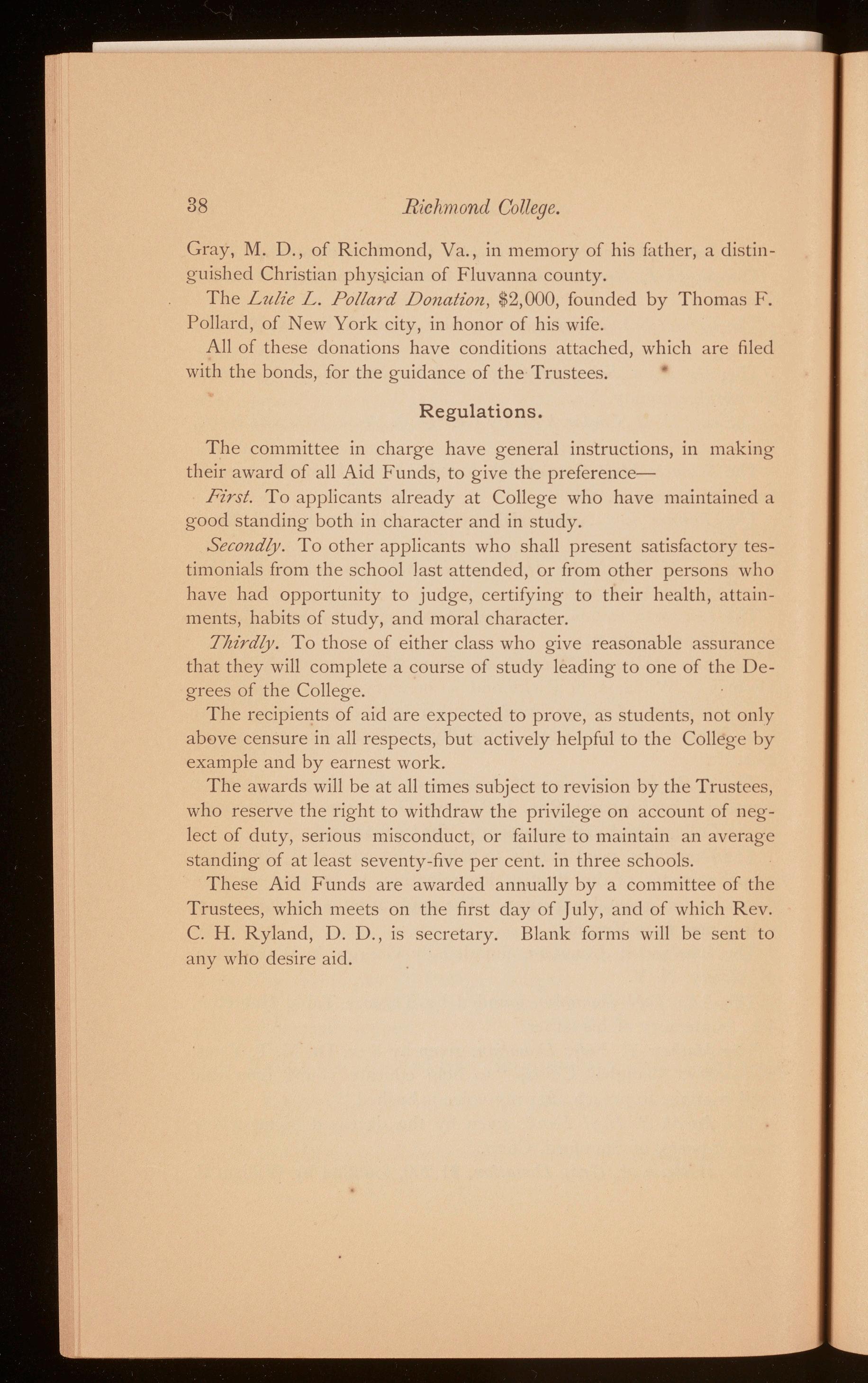
38 Richmond College.
Gray, M. D., of Richmond, Va., in memory of his father, a distinguished Christian phys.ician of Fluvanna county.
The Lulie L. Pollard Donation, $2,000, founded by Thomas F. Pollard, of New York city, in honor of his wife.
All of these donations have conditions attached, which are filed with the bonds, for the guidance of the Trustees.
Regulations.
The committee in charge have general instructions, in making their award of all Aid Funds, to give the preference-
First. To applicants already at College who have maintained a good standing both in character and in study.
Secondly. To other applicants who shall present satisfactory testimonials from the school last attended, or from other persons who have had opportunity to judge, certifying to their health, attainments, habits of study, and moral character.
Tlzirdly. To those of either class who give reasonable assurance that they will complete a course of study leading to one of the Degrees of the College.
The recipients of aid are expected to prove, as students, not only above censure in all respects, but actively helpful to the College by example and by earnest work.
The awards will be at all times subject to revision by the Trustees, who reserve the right to withdraw the privilege on account of neglect of duty, serious misconduct, or failure to maintain an average standing of at least seventy-five per cent. in three schools.
These Aid Funds are awarded annually by a committee of the Trustees, which meets on the first clay of July, and of which Rev. C. H. Ryland, D. D., is secretary. Blank forms will be sent to any who desire aid.

\the lEnbowment.
Richmond College has passed the line of venture, and, by reason of its admirable location, thorough safety, and conservative management, is in condition to give the amplest security for the prompt and effective use of all gifts. No institution affords a better field for investment by those who wish to promote high, Christian education.
The Trustees invite the attention of the benevolent first of all to the General Endowment. This fund is devoted to the support of the teaching department. The income from it at present is inadequate. Gifts that are unconditional, save that the income from them shall be used to pay teachers, are urged with the assurance that they will be safely investee! and the income used solely for this high purpose.
There are two endowed Schools-Law and Philosophy. Each of these is founded upon a paid-up endowment of $25,000, and each bears the name of the donor. Similar endowments for other schools would be most timely and helpful. The College is addressing itself to the enlargement of the scientific department, and offers a generous field in this direction for laboratory building and equipment. In addition to these the Library, Aid Funds, Museum, and Physical Culture departments may arrest attention and elicit donations. To any who wish to help, there is a wide field for choice and demands are pressing. The Financial Secretary will be glad to correspond with the friends of the College and afford them all information bearing upon the great work of building upon the foundations wisely laid by the fathers for Christian education. There is nothing more stable than the well-endowed college, and names linked with it will never die.
Form of Bequest.
"I give and devise to Richmond College, located at Richinond, Virginia, the following real estate, to wit (here describe the said real estate, as to kind, quantity, and situation).
"I also give and bequeath to the said College the sum of . . dollars($ ... ), and the following bonds (or stocks), to wit (here describe the bonds or stocks), all of which are to be used for the following purposes, to wit (here describe t!te p1trpose for w!tic!t it shall be applied)."
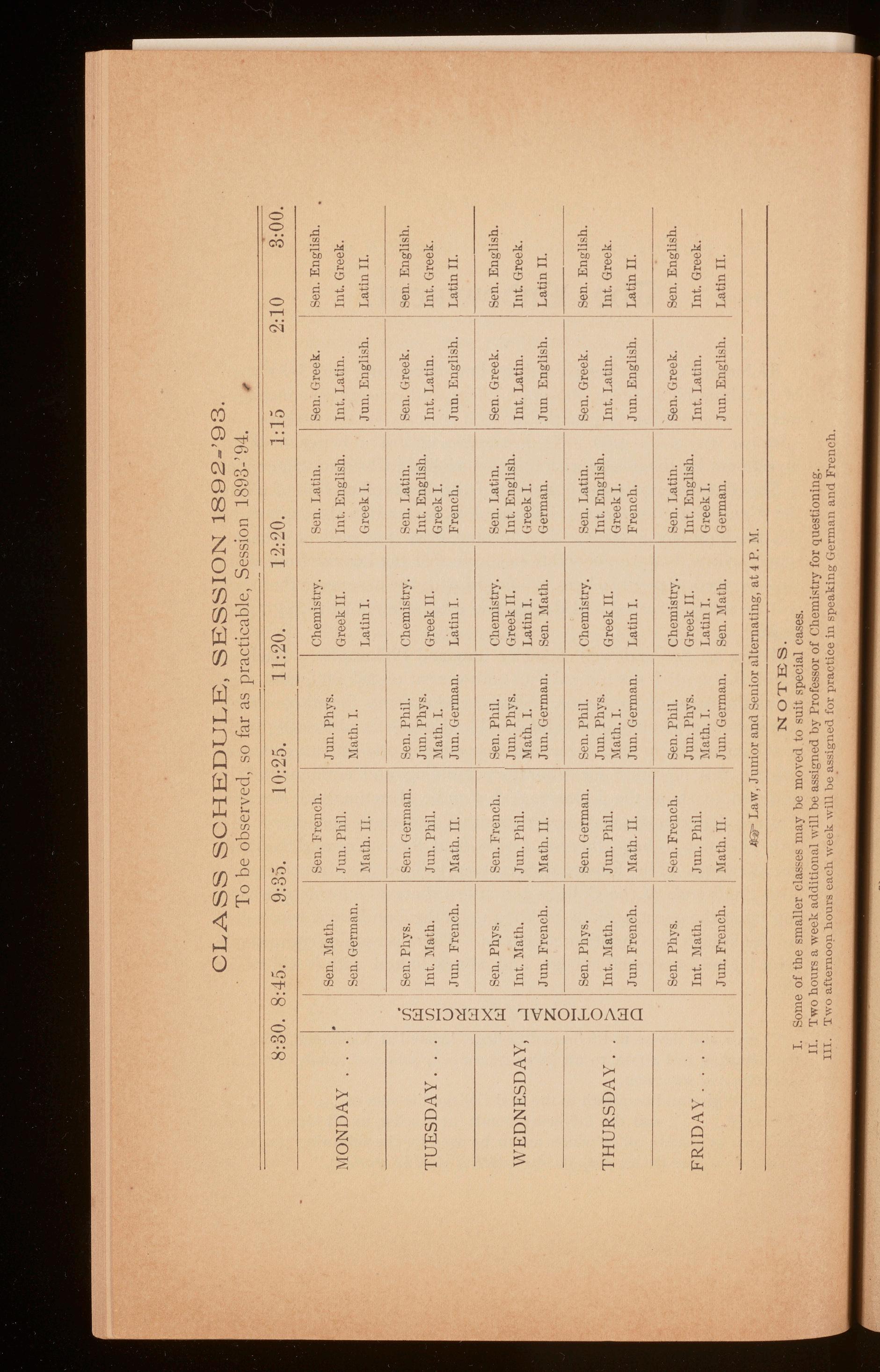
CLASS SCHEDULE, SESSION 1892-'93 . To be observed, so far as practicable, Session 1893-'94. 8:30. 8:45. 9:35. 10:25 . 11:20. 12:20. 1:15 2:10 3:00. I Sen. French.
Chemistry. Sen. Latin. Sen. Greek. I Sen. English. . Sen. :\lath. Jun Phys
Greek II. Int. English. Int. Latin. I Int. Greek. Sen. German. J\Iath. I. I )lath. II. Latin I. Greek I. Jun. English. Latin II. ----I Ren. English. ui Sen. Phys. Sen. Gern1an.
l\IONDAY Jun. Phil.
Sen. Phil. Chemistry. Ren. I.atin. Sen. Greek.
µl Jun. Phys. Int. English.
Greek II. Int. Latin. Int. Greek. u J\Iath. I. Greek I. Jun. French. l\Iath. II. Jun. German. Latin I. French. Jun. English . Latin II.
TUE S DAY. {/J Int. Math. Jun. Phil.
µl I Sen. Phys. ?< Sen. French. Sen. Phil. Chemistry. Sen. Latin. Sen. Greek. Sen. English.
µl
WE D N ESDAY, Int. J\Iath. Jun. Phil. Jun. Phys . Greek II. Int. English. Int. Latin. Int. Greek. ....l Math. I. Latin I. Greek I. <t; Jun. French. J\Iath. II. Jun. German. Sen. J\Iath. German. Jun English. Latin II. z I ~ Sen. Phys. Sen. German. Sen . Phil. Chemistry. Sen. Latin. Sen. Greek . Sen. English.
THURSDAY . 0 Jun. Phys. Int . English. > Int. l\Iath. Jnn. Phil. Greek II. Int. Latin. Int. Greek. µl l\Iath. I. Greek I. I Latin II. r=l Jun . French. J\Iath. II. Jun. German. Latin I. French Jun. English. 1Sen. Phys. / Sen. French. Sen. Phil. Chemistry. Sen. Latin. Sen. Greek. Sen. English.
FRIDAY . Int. Math . Jun. Phys. I Greek II. Int. English . Int. Greek. 1 Jun. Phil. l\Iath. I. Latin I. Greek I . Int. Latin. Jun. French. l\Iath. II. Jun. German. Sen. J\Iath. German. Jun. Engli s h. Latin IL f¥iJ" Law, Junior and Senior alternating, at 4 P. J\I. NOTES. I. Some of the smaller classes may be moyed to suit special cases. II. Two hours a week additional will be assigned by Professor of Chemistry for questioning. III. Two afternoop. hours each week ·will be assigned for practice in speaking German and French.
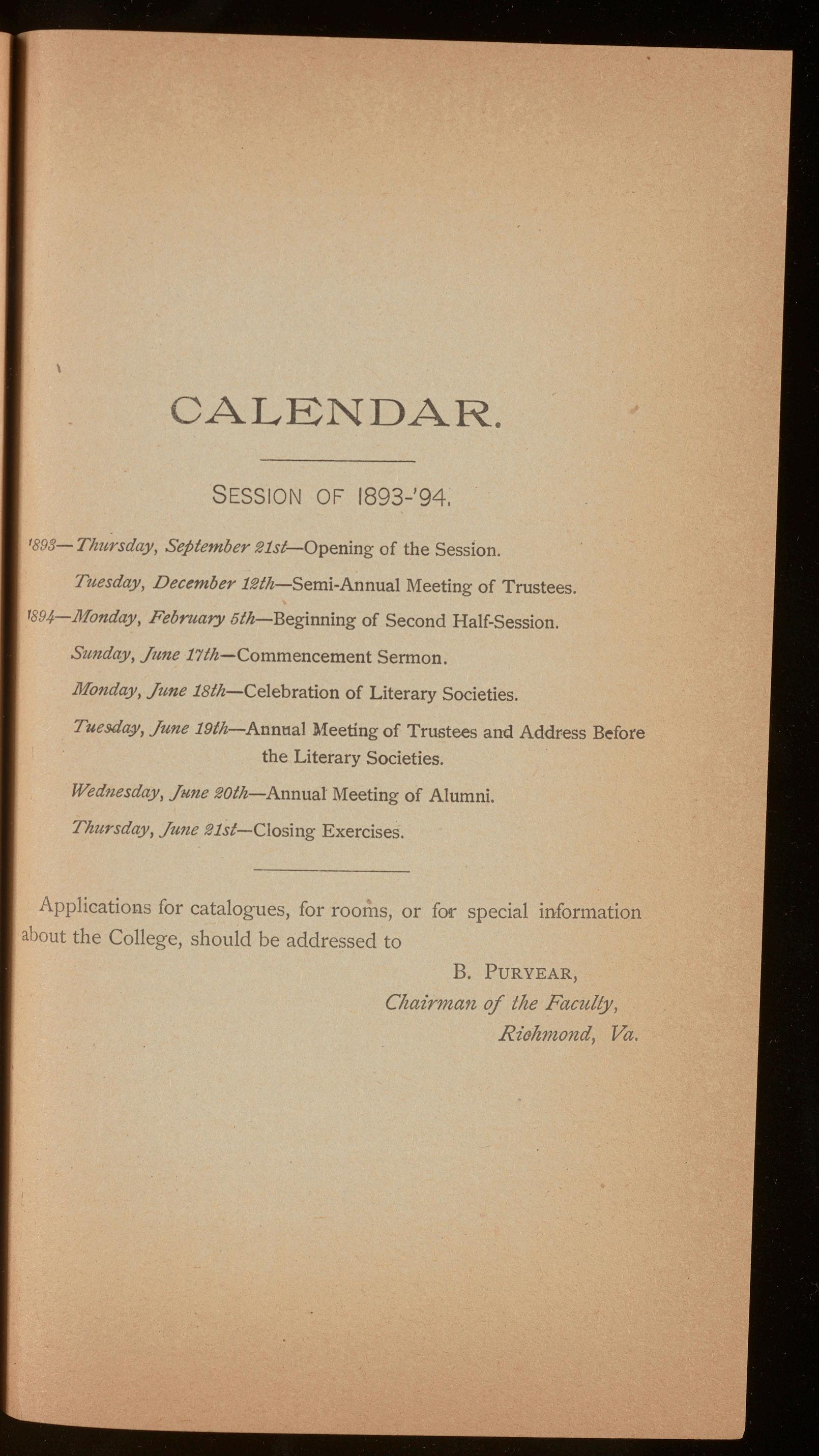
CALENDAR.
SESSION OF 1893-'94,
1899-Tluwsday, September 21st-Opening of the Session. Tuesday, December 12th-Semi-Annual Meeting of Trustees. 1894-llfonday, February 5th-Beginning of Second Half-Session. Sunday, fime 17th-Commencement Sermon.
11:londay,fime 18th-Celebration of Literary Societies.
Tue3day, June 19tk-Ann11al Meeting of Trustees and Address Before the Literary Societies.
Wednesday, June 20tli-Annua1 Meeting of Alumni.
Thursday, fime 21st-Closing Exercises.
Applications for catalogues, for rooms, or foc special information about the College, should be addressed to
B. PURYEAR, Chairman of the Faculty, Riohmond, Va.

